#. meta‚ the grace of the gods is a grace that comes by violence.
Explore tagged Tumblr posts
Text
ainulindalë meta (II)
Index post here
Themes and comparison
the narrative of the ainulindale is divided into three themes (T1, T2, T3, for short), musical segments that occur in sequence in the 'timeless' halls, the Ainur and God's transcendent abode. the timeless halls are different from the Void.
each has a similar narrative structure: first we are told something about Eru (an action, or an emotion), then there's a description of the beginning to the musical segment, followed by an event (related to the Discord, that breaks the Harmony), followed by development(s).
for T2 and T3 we also have a comparative description to the themes before. T1 has nothing to compare itself to, as before was silence.
in addition, i think we could add an 'aftermath' (A) and analyze a similar sequence, so we can make an overall discussion for each (T1, T2, T3, A). i think we can map how the structure/sequence of the music matches the periodization of the ages, the sequence and meaning of events in the overarching narrative of arda. i might go on a lot of metaphysical tangents while i do that.
so first i'm going to go through each point for the themes and the aftermath, comparatively. when all the parts are laid out i'm going to discuss that correspondence with time-reckoning, lore events, and themes that have mostly to do with tolkienian theodicy and eschatology - like the doom of men and apokatastasis.
this includes discussing some heavy (both christian, but really universal too) anthropo/theological concepts. so on to it:
T1: -Eru: Eru teaches the Ainur to sing collectively (as a 'choir' capable of harmony) by playing each their part, filling their role -Beginning: Harmony of the Ainur -Event: Discord of Melkor 'to aggrandize his role' -Development(s): Storm of sound -Comparative description: n/a
T2: -Eru: Eru is amused ("smiles"), raises his left hand -Beginning: Second Theme "gathers power" and finds "new beauty" -Event: the Discord rises "in uproar" and "contends" -Development(s): War of sound "more violent than before" / many Ainur "sing no longer", others "joined the Discord" and Melkor "has mastery" -Comparative description: the Second Theme is "like and yet unlike" the First Theme
T3: -Eru: Eru is displeased ("stern") and raises his right hand -Beginning: Third Theme is "first gentle" but "gathers power" in "profundity"; it is described as 'deep, wide, slow', blended with "immesurable sorrow" from which its "beauty chiefly comes" -Event: Discord tries to "drown" the theme by "violence"; it is described as 'loud, vain, endlessly repeated', itself with little harmony but "unity of its own" in 'clamorous unison' -Development(s): the more triumphant notes of the Discord are 'woven into' the 'solemn pattern of the theme' / the Halls and beyond "shake with tremor" -Comparative description: the Third Theme is unlike the other themes - conceived by Eru alone, unknown to the Ainur 'in counsel'
A: -Eru: Eru is angry ("terrible") and raises both hands -Beginning/Event: a Piercing Chord -Development(s): Silence & Melkor's Shame -Comparative description: n/a (the music ceases) - until there should be a "New, Greater Music" with the Children (Elves, men, etc) aka a Second Music. The Ainulindalë is thus the First Music (a "Great" music), distinct from the Second; all Themes discussed are of it.
Discussion
The First Theme is the most straight-forward. Eru is teaching the Ainur each their own role, preparing them for the intended Harmony that would produce creation in its state of grace: Arda Unmarred, the world before Melkor's corruption.
Melkor, the most powerful Ainu from the get-go, seeks to aggrandize himself, actually, to take on the role of creator. this is clearly, in the beginning, about his desire to imitate his creator and create. creation is good; there is no inherent desire to surpass, destroy, or spoil.
while you can argue the imitation of god is intrinsically hubristic and bad from a human perspective, perhaps it is more plain to simply say it is a kind of attempt from melkor to attain 'full' divine capacity, and leave value judgments to the (literary) creator about whether such an apotheosis is good or bad or neither. I think Tolkien answers that through his envisioning of the Second Music.
at any rate, to create Melkor needs sth called the 'Secret Fire' or Flame Imperishable that is within Eru itself, so he can't get it. he doesn't know it, and he clearly thinks it is possible for him to attain it, so he seeks it in the Void.
in seeking this he leaves the rest; he is already different by nature -all of them are distinct from each other, individual and free-, but Melkor also becomes more unlike the rest in this darker way out of his own actions. he is in the Void only with his own thoughts, and thus his worries are concerns are for himself alone.
i think it is interesting we are told about assigned roles (by a figure of authority) and not natures. Ainur are to play their part in a symphony, that possibly God has fitted to the natural qualities of each, but they are roles nonetheless. nothing says that one Ainu could not have played the role of another.
Melkor's conflict is to fulfill his assigned role. so this is important: when it's God's time and he returns, Melkor is able to sing in Harmony but he chooses not to. Melkor is free and exercises his freedom in this manner. it is not his nature to break from his role, it is his chosen option.
and it's not just about singing differently (quality) but something about quantity or "how much" he takes for himself. the metaphorical "space" he occupies in the melody being greater ('aggrandize') than was presumably assigned to his role.
this behavior produces the Discord because it does not match with what the rest is doing. the manner God instructed them to fulfill their roles within the whole was not intended for Melkor's rebellion, it was intended for Melkor's assignment.
but Melkor is only truly concerned with his role and not with the whole symphony. he is a part, but he becomes totalizing and the part changes the whole from perfectly harmonious to imperfectly dissonant. the harmony and unity in the First Theme are broken.
it's described as the "storm" of sound.
a storm, so we're supposed to think of thunder. big noises associated to fires and danger that startle us because it is, well, unpleasantly coming out of nowhere from our perspective.
Melkor's sound is unexpected, loud, unpredictable to the rest of the Ainur who have not strayed in his singular pursuit, which itself comes from his singular, god-given nature.
there's a combination of qualities we are given as naturally Melkorian, (1) being mightiest among his peers -thus having no real equal in power (not necessarily the same as strength)-, (2) a strong and relentless creative desire, (3) a restlessness that drives him to the Void to seek out what he longs for (through the Secret Fire) - to fulfill his nature instead of his role.
it will later become unavoidable to think about whether Melkor (among others) has or doesn't have, retains or doesn't retain, redeeming qualities. I think it doesn't matter in that these are qualities explicitly stated in the narrative as god-given gifts. not only that, i think it's a wrong frame of thought. Melkor exists, so they are qualities period: without any of them, Melkor wouldn't be Melkor.
he would be less able/unfree to alter creation and sub-create, unmoved to do so, or apathetic despite wanting to - and we may post hoc wish for this or see this in a positive light - but he wouldn't be the individual spirit created by God in any of those hypotheticals, so clearly the Creator hasn't created a Melkor-less world, just like he hasn't created a world without any other spirit of child. we are where we are, just like the Children are in Arda.
#trop#rop#rings of power#the rings of power#lord of the rings#the lord of the rings#silmarillion#lotr#tolkien#ainulindale
10 notes
·
View notes
Note
hc + home.
hc + / courtesy of @beasteaten
home was an apartment on the ark . where she learned to walk and draw . where her dad and wells we still alive . where they were happy and their problems felt far away . it was where she was the simplest . the most unburdened.
home could have been the dropship if it weren’t surrounded by so many graves . if they hadn’t been so young , if it hadn't been such a fight . it might have been home if it was every really theirs to begin with . it could have been if they had ever stopped running and just started living .
home could have been arkadia if it weren’t filled with ghosts who weren’t yet dead , and those that were . if she hadn’t torn her soul to pieces to make it one . it could have been if they had let it . if the burden was not on her and her alone . it was tents and cold metal walls and an increasing panic that it would never be more . that she may not survive long enough to see it . it could have been , if she hadn’t been terrified of what that meant .
home is two arms . it’s blue eyes and lips that whisper her name in reverence . it’s the pitter patter of little feet on cold stone . it’s a man who stayed her friend no matter how much their love grew . it’s mountains and snow and a people hardened by life . it’s watching her firstborn take his first steps . it’s watching him walk into war . it’s a throne and the one beside it . home is loving a child that is not her’s by blood . it’s a shoulder she can always cry on , a heart that will never belong to anyone but her . it’s knowing that she’d sacrifice anything ( anyone ) to keep them safe . it’s a journal of half finished sketches and a lifetime of love . it’s laughter while his hands are on her hips and his lips on her throat . it’s the six heartbeats she felt from within her and the one she didn’t .
home is him .
home is everything they built together .
#i may or may not have cried at the end of this#i will not confirm nor deny#beasteaten#. answered‚ goddesses don’t speak in whispers‚ they scream.#. meta‚ the grace of the gods is a grace that comes by violence.
4 notes
·
View notes
Note
a concept: roan casually holding clarke's hand in the throne room while taking care of business
her thumb rubs circles over the back of his hand , eyes flitting over their council . only interjecting when she needs to , content to sit and listen to her husband’s voice — a sound she fell in love with many years ago .
they’re back in azgeda now . madi is grown and able to rule over polis on her own — they are no longer needed . their first grandchild is expected in the fall , she knows toron will be an excellant father — �� just like roan is .
they’re no longer such an oddity , azgeda ( and the rest of the coalition ) do not think twice about the casual touches and doting gazes . of the gruff king that smiles more now than ever before he brought his wife home . of the steel queen that laughs like wind chimes when her husband whispers in her ear . no matter how many years go by , they seem to fall more deeply in love with each passing day .
the once cold palace is filled with love , something it was horribly lacking before . the sound of little pitter pattering feet will soon return . their family will continue to grow . her children are safe and coming into their own .
clarke squeezes his hand when she can feel him growing exasperated , just to let him know that she’s on his side . that she always will be .
#roan and clarke invented true love byeee#azhefa#. meta ›› the grace of the gods is a grace that comes by violence.#. arc . iii ›› the wildest of the wild the wolf leading wolves.#. rel . azhefa ›› ain't we a pair.#. rel . roan ›› the rules of fair play do not apply in love and war.
3 notes
·
View notes
Note
The things about anyone who sides with Edelgard is fine actually (tm) interesting and I agree I remember seeing a Twitter post about what a bad character Monica was and the reply was "She actually has a lot of depth and plot relevance because she’s a lesbian. Hope that helps" That doesn't make her a better character? These are the same people who dislike the other simp characters right? They even said it's an insult to compare her to Faye. Why because it's Edelgard she simps for?
God “she’s a lesbian so she must be a good character” gives me the same vibes as “this story is deep because a girl got sexually assaulted” vibes (ETA: See the edit below for further explanation on this one). Like for some people that’s where the whole depth begins and ends. It’s mere existence within the narrative is somehow enough, no need to justify its existence with actually good writing or sensitive handling or meaningful integration into the narrative.
She is fundamentally exactly 0% different from the Faye archetype. Her simping for a girl over a guy does not make her somehow deeper than that. And why should it? Being a lesbian isn’t some deep or profound experience in itself. It’s literally basic biographical information about who you like to kiss/bang. The interesting parts are how it informs your world view and the person it makes you. Which, and I cannot stress this enough, is given exactly zero focus in Monica’s story. So no, it does not make her interesting or better than the other Fayes.
ETA, since it might be unclear why I'm making this comparison in the OP:
It’s the same principle to me: predominately straight, predominantly cisgendered, predominantly men co-opting the experiences of women/queer people under the false impression that it creates narrative depth, while refusing to understand or portray those narratives in a way that is meaningful or relatable to the people they presume to be representing.
I suppose I could have used something different, but SA was simply on my brain because I watch quite a lot of horror games (happy October!), and sexual assault is a very common theme in the genre. It’s frequently treated as a writing crutch, the “easy button” to portray a horrific experience (since naturally all decent people are horrified by it) but it doesn’t say anything. It’s there to create shock value rather than to be a meaningful exploration of women’s experiences with sexual violence or the culture that helps perpetuate it, and thus its use in story or in argument winds up coming off as cheap. The women who experience it in these games are often portrayed as if that is the ONLY thing about their experience that matters, and you are often given no further detail beyond their name (sometimes not even that) and the fact that they were assaulted. It’s incredibly uncomfortable and dehumanizing to hear the meta-message: “The important thing about this character is the fact that they’ve been assaulted. Nothing else, just that. When you are assaulted, there is nothing meaningful about you aside from your experience with assault and thus we feel no need to engage with your experience further.” Not to mention it can have very sexist undertones, but that can be a story for another post.
(Note that I am not saying all portrayal of SA in media is like this. But you can usually tell when a writer is attempting to approach a subject with sensitivity and grace and when a writer is leaning on it as an emergency writing crutch. I’m also not implying that only women experience SA, however in the horror genre this type of writing is disproportionately applied to female characters and is often very gendered).
Similarly, being queer is frequently treated as a meaningful character trait in itself with no need to explore further or engage meaningfully with the experiences of queer people. It can come off as tokenism and dehumanizing to be told the meta-message: “The important thing about this character is the fact that they’re queer. Nothing else, just that. When you are queer, there is nothing meaningful about you aside from who you love and/or who you bang and thus we feel no need to engage with your experience further.” I shouldn’t have to say this, but queer people are complete human beings with a depth of experience and being reduced down to our sexuality, by people who frequently do not look like us I might add, is certainly something. Heterosexual people are never treated as if their experience starts and ends with their sexuality, and I simply believe we deserve the same respect. And being queer should not be treated as a shield against character criticism. Being queer does not make you better or worse than anyone else.
[This part in response to someone claiming that the statement in question in the anon was a joke]
And I’m sorry, but I can’t know whether someone is joking when they say stuff like “being a lesbian gives you depth” on the internet. I don’t know if they’re gay, straight, man, woman, enby, cis, trans, or anything else. It’s not as if every person who says that kind of thing is joking. So I’m approaching it with a serious tone, because even if this particular person is joking and is the kind of person who understands the queer experience, this is still a mentality that is often found in media representation of queer folk and it does warrant discussion from that perspective.
14 notes
·
View notes
Text
In Today’s Edition of People Being Wrong on the Internet
This is going to be a vague-post because I don’t feel like going through the effort of anonymizing the screencaps of the Bad Take in the Our Flag Means Death fandom that just irritated me. And ye gods do I wish blocking people on tumblr meant that I wouldn’t see their shitty meta anymore. Anyway, in no particular order, here goes:
Izzy is not Ed’s abuser. If Ed secludes himself from the rest of the crew, that’s because of Ed’s [depression-influenced] decisions; Izzy’s not locking him in. Nor do we ever see Izzy try to prevent Ed from interacting with the crew as a whole.
While there’s a lot of co-dependency and toxicity in Ed and Izzy’s relationship, it says a lot about both that Ed accepts Izzy’s honest (and often vulgar and abrasive) opinion, and that Izzy feels comfortable speaking so freely to him.
When Izzy tries to leave (in episode 4), it’s Ed who stops him from doing so. When Ed effectively has to choose between Izzy and Stede (in episode 6), he watches Izzy row away. Ed is not trapped in a situation with Izzy.
Izzy doesn’t want to be in control of Ed, although he does want Ed to act a certain way (because he believes it’s necessary for them to Not Die). This isn’t even, like, a virtue on the part of Izzy; he’s just very clearly a submissive. He wants Ed to be in charge and to be Ed’s trusted right hand man.
Izzy didn’t sell Ed out to the British; he instructed Calico Jack to get Ed away from the Revenge before the British showed up. Come on, fandom! This is literally text in the show! Ed being remanded into the custody of “Captain Hands” isn’t Ed being enslaved to Izzy. It’s not even Ed being put in a subordinate position to Izzy because shortly afterward, Izzy speaks very passionately about Ed being Izzy’s captain, with Izzy talking about himself as Ed’s first mate.
From a Watsonian perspective, the reason Ed gets remanded into Izzy’s custody is because Badminton (if not the rest of the British) cares only about killing Stede. Given that Ed wasn’t supposed to be on the Revenge when the British showed up, him being remanded into Izzy’s custody couldn’t have been part of the original deal. There’s gap where we don’t know how Izzy persuaded Badminton to do that.
From a Doyleist perspective, the reason Ed gets remanded into Izzy’s custody (shortly to regain his position as captain) is that Ed needs to be positioned in the narrative as able to get off scott free...as long as he lets Stede die. The significance of Ed giving up everything for Stede (by enacting the Acts of Grace) only works if Ed had something to give up.
Finally, no, Ed’s violence against Izzy isn’t “reactive abuse”. OMG no! He punches Izzy because he’s angry at Izzy trying to get Stede killed. He chokes Izzy because he’s angry at Izzy berating him for pining for his boyfriend. And he cuts off Izzy’s toe and forces Izzy to eat it because Ed is asserting control over Izzy. If he was afraid of Izzy, he could have stabbed him in his sleep or put him on the next rowboat off the ship.
Here’s something important to keep in mind: nobody (except Ed) fucking likes Izzy. There’s a structural factor to abuse, and within the societal structure of the Revenge, Izzy holds no power except that given to him by Ed with him being Ed’s first mate. All Izzy’s authority is derived from Ed’s authority. Which is why, when he did become captain, he got mutinied against in, like, a day.
In conclusion, Izzy’s all around an emotionally stunted jerk with shitty interpersonal skills and some serious hangups. But give Ed some fucking autonomy! Let him being accountable for his own character flaws!
#our flag means death#meta#someone was wrong on the internet#but i'm being so brave about it#by not responding to them directly#because they don't deserve to be dogpiled for having written bad meta
18 notes
·
View notes
Text
The Quackity Meta: a Tale of Two Absolutes
More than anything else, Quackity wants control, and to never, ever lose his own autonomy. And that is why he despises Technoblade.
But wait, how is Technoblade a threat to Quackity's autonomy? Techno is all for individual freedom! He wants to eradicate the government so that no one can be controlled!
There's the question though... How do people exercise control within the framework of a video game like m/inec/raft?
“a person exercising power or control in a cruel, unreasonable, or arbitrary way.”
Power on the Dream SMP cannot be translated one-to-one with real life power. In real life, yes, a government had infinitely more power than an individual, for numerous reasons. But on the Dream SMP, the government's power is always directly tied to the power of the individuals who are willing to defend that power.
Technoblade is powerful. This is not debatable. How he uses this power, historically, has been a mix of generosity and self-interest*, although primarily the latter.
Generously, He gains resources and then distributes them to his allies during the Pogtopia Rebellion, gearing everyone up and giving them a fighting chance against Dream. However, in the aftermath of Tubbo's being appointed president, Techno turns on them, swiftly and mercilessly. The moment that it becomes clear** that Pogtopia's interests don't align with his own, he crushes them with the aim to prevent them from ever recovering.
( *I use self-interest as a neutral term here. Everyone on the SMP is selfish to some extent – it doesn't make them evil, and in fact has been treated as a positive at times, as well as a negative.
**I want to note that whether or not Technoblade knew of Pogtopia's goal of reinstating the government is unclear. It would seem that from Techno's POV that he didn't know, or assumed that it was a minority who wanted another government. But on the other hand, no one was actively lying to him about their intent, and people like Tommy and Quackity made their goals very clear. Further doubt is cast on the idea that Techno had no idea when you take into account that he enchanted the Netherite armor in the vault with worthless enchants like Fire Res.
Ultimately, there's no way to know until it is confirmed by cc!Techno himself, and it doesn't pertain that much to this analysis, but I'm aware that it's a hotly debated topic so I wanted to address it.)
It can be argued that Techno's destruction of L'manberg, both the first and especially the second time, was necessary. It can also be argued that it was cruel and a disproportionate retribution against both culpable and innocent parties. Extant of these arguments however, how does it feature into control?
Well, we can’t talk about control without mentioning the most controlling force on the server and the other person on Quackity's hitlist, Dream.
Dream is a tyrant. I don't think anyone can really make an argument against that in good faith at this point. He ticks off every box, no matter how vague or esoteric. This makes the interactions that Quackity and Techno have with him very interesting.
Quackity despises Dream. He's one of the earliest adopters of the hating-Dream-train, to the point that some people have compared him to Cassandra, a priestess who was cursed with the vision of prophecies that would always be true, but never believed. And indeed, Quackity's apprehension of Dream comes in as early as Pogtopia, and grows at a steady pace after the fact.
But despite his rightfully calling out Dream's hypocrisies and his controlling tendencies, Quackity was largely ignored on this front, especially when the time came to exile Tommy and Quackity basically predicted the next arc – If they gave Dream this concession, they would never be able to get out from under his thumb. Flash forwards to the Green Festival, and the moment Tubbo hands over the discs, any illusion of nicety drops and Dream proceeds to destroy them, side by side with...
Technoblade has always had an amiable relationship with Dream. From their first proper interaction on the server being Dream giving Techno some hefty resources, to their snap team-up on Doomsday, they've had a smooth time, with some notable bumps.
Techno fought against Dream during the Pogtopia rebellion, but when it became clear that Dream was more invested in chaos than his other allies, Techno temporarily allied with him to summon the Withers and drive the nail deeper into Manberg’s coffin.
The only time Techno has really bothered to challenge Dream directly is when he came for Tommy in exile. Techno went to great lengths to protect Tommy, hiding him and distracting Dream.
He did give Dream the option to call in his favor and take Tommy, but there are arguments to be made that he did this more as a challenge – that Tommy is worth the favor. Again, we probably wont ever know.
The difference in their relationships with Dream is polarizing. It also reflects the difference in personality – Quackity is an aggressive, ambitious person, whereas Techno leans more towards passivity and caution. Quackity is looking for enemies to challenge, where Techno is avoiding them, people who actually stand a chance against him most of all.
Technoblade is an individual with extraordinary amounts of power. Others have pointed out that he is rarely challenged by other characters or the narrative, and regardless of the merits or flaws in that, it paints him as nearly untouchable. His being in the good graces of Dream only adds to this.
And like with Dream, the only way that people have been able to threaten Techno is when they work together. The Butcher Army, for all it's flaws, managed to capture Techno through numbers – with Tubbo and Fundy (barely) holding off Techno's blood rage while Quackity snuck off to take Carl hostage. And they would have gotten away with it too, if the other most powerful person on the server hadn't stepped in – both by pointing Techno to a totem of undying in the days before the attack, and by getting Punz to cause a distraction and directing Techno to the final control room, where he could escape with Carl.
So, if the most powerful person in the world can only be threatened by people working together, and the most common form of organization is by government, then what does it say about Technoblade, who wants the government destroyed?
People like Tubbo, Fundy and yes, Quackity, all benefit from organizing and working together. They all tend to be less armed, less ready to defend themselves, and completely unable to stand up to titans like Techno and Dream on their own. It's safety in numbers, but it's also control, and control is power.
Ranboo's insistence that Snowchester is a Government is interesting when viewed through this lens. Ranboo is another person who is insanely rich, and able to defend himself and his belongings consistently. Ranboo doesn't need other people to defend him – he's living with Techno and Phil not out of necessity for his survival, but out of need for connection with others.
This seems to be the main difference he finds with Snowchester, which has a more structured environment, geared to defend itself and it's people, if harm should come their way.
Which makes sense, considering it's founder, Tubbo, holds no earthly belongings, and Jack, another prominent member, has made a character trait out of losing his things every other day. The two of them have no conceivable way to defend themselves against people who are stronger than they are. But together, holding the keys to nuclear armaments, they can suddenly play on the field of gods.
The anarchist commune, despite having all members working together and being on good terms, aren't really an organization, they're individuals with common goals and interests. They don't need to live together to be strong, they're all already strong, they choose to be near each other because they want to.
Snowchester is not a government and has no ruler, but together, it's members hold power. They have sway in the world when they work as a collective, and most members have a vested interest in keeping themselves and each other defended because of this. Consequently, the “identity” of Snowchester becomes more prominent, resulting in the flag, the uniforms and the, well, identity.
(Now, the more perceptive among you might have noticed that I basically just compared Techno Phil and Ranboo to the ultra rich 1%, which. Um. Is a pretty serious comparison to make about in a block game rp?
And I wanna say that I don’t think this was necessarily intentional on the parts of either the CCs or the characters, and beyond that, it’s just one way of examining the text. This analysis is by no means the “Right” way to view the story, just a different one.
Regardless...)
Techno uses his considerable power to further his own goals, first and foremost. This is not inherently good or evil, it just is.
Contrast with New L'manberg's cabinet; Four people, pooling their limited power to further their shared goals. Not good or evil, just a way of exercising power.
But power is not static. Power is fluid and changing, moreso now on the SMP than ever before, and Quackity and Technoblade are fighting to define what Power means going forwards.
Techno is fighting for the status quo, knowingly or not. Individuals with power should lead the world, and those without should strive to emulate their betters. He destroys all forms of government, which strip away the rights of the individual in exchange for hierarchy and consolidated power within that hierarchy.
At it's best, this is a very freeing ideology, where nothing and no one can hold back the individual. The world is your oyster if you are willing to work for it.
But at it's worst? “Violence is the only universal language,” is the key phrase. Where does this ideology leave people who aren't strong? Where does it leave those who cannot fend for themselves? If Violence is the only universal language, then the weak have no means to speak.
Quackity is fighting to get a foothold for a contrary ideology – One that prioritizes words over violence and offers alternative methods of gaining and exercising control, such as through currency and conversation. Quackity has tried to varying degrees of success to implement this on the level of his own individual power, such as during the elections, but his attempts at employing this on a grand scale have all been short-lived.
At it's best, this ideology can uplift anyone, regardless of their strength. It encourages more communication, more commerce, and thrives under, you guessed it, strong government.
At it's worst however, it creates a brutally controlling environment. Where a few people gain absurd amounts of power through the complex machinations of a fiat currency, and are then able to use their sway and influence with governing forces to exercise power that they would never be able to hold on their own.
Again, neither of these ideologies are inherently good or evil. They both have flaws and benefits, and benefit no one more than perhaps Techno and Quackity respectively, while hindering the other.
Techno is benefited by anarchy because he holds incredible amounts of individual power. He is the strongest person on the server, he is rich beyond anyone's wildest dreams, and on a meta level, he's straight up good at the game. The current status quo puts him firmly at the top of the food chain, and this is most obvious on Doomsday, when he and the other two most powerful individuals (Dream and Philza) come together and crush the combined forces of New L'manberg. They are not meaningfully challenged in any way, whatsoever.
Meanwhile, Quackity is deeply hindered by the current status quo. He's not strong, he's poor, and he's vulnerable to anyone who wants to bully him with brute force. On a meta level, cc!Quackity just straight up does not play m/inecraf/t as much as some of the other people that on the server. (To be clear, I do not mention that as a criticism, just to contrast Techno. Neither of their levels of play are better or worse for content, they just add to the experience differently.)
On the other hand, in a government? Quackity “Law Student” HQ is suddenly on top. He's charismatic enough to debate with Wilbur “Can Talk His Way out of Anything” Soot during the elections, and come out of that arena smelling like roses. Back during the days of El Rapids, Quackity held his men back from conflict with Dream, and talked him into a corner of technical truths where Dream had to concede that he viewed El Rapids as an independent nation if he wanted to get involved with their conflicts.
And Techno, while he is brilliant and an English Major, suddenly loses a lot of his intimidation factor if he has to respect laws preventing brutal murder. Techno can certainly debate, but his go to conflict resolution is usually violence, and if you take that away, you take away the threat of challenging him. Because make no mistake, challenging Technoblade right now? Is suicide.
And this duality, this grey morality and clash of ideals, is why Quackity is my favorite character on the SMP. He isn't strong. The power he holds is tenuous and balanced on a knife's edge. It would make more sense for him to stay quiet, keep his head down, and if anything, try to change things from the shadows, where he'll be in the least danger.
But he isn't quiet. He doesn't just challenge authority, he challenges the authority; Dream, Wilbur, and of course, Technoblade.
And in all but one of those matches, he's come out with a concession from his enemy gripped between his teeth. He schooled Wilbur in the debates. He forced Dream to grant El Rapids Independence at a time when he hadn't done so for New L'manberg.
But he failed miserably when he challenged Technoblade. Quackity lost that fight in the final control room before it began. He lost the moment he formed the Butcher Army. He would have lost if he managed to kill Technoblade, and he lost still when he died.
He lost because he conceded that the only way to achieve his goal was through violence. He decided that the only way to establish himself and New L'manberg as powerful? Was to kill Technoblade. And he lost that fight and he always will. There was never a way that he walked out of that fight with the victory; Quackity lost the ideological battle long ago.
But not the war.
As of writing this, Quackity is in the process of introducing an economy to the Dream SMP, on Sam's initiative. There is no action I can think of that is wiser for him to take right now. Now, when Dream has been deposed and there's a vacuum in power; Now, when people are getting tired of endless violence and the loss it brings; Now, when people are looking for something new.
An economy is a direct challenge to Might Makes Right. Trading, supply and demand, politics. It offers a new way for people to obtain resources and a direct alternative to brute force; other methods to pay for slights and breaches of honor and etiquette. No more will pet wars be fought with iron swords and shields, but with money! A healthy sum of cash for the murder of Fungi!
If Quackity can get this system off the ground (and with Sam's help, he definitely can,) the stage would suddenly be tilted in the favor of not just Quackity, but the people who he has associated himself with most closely – Tommy, Fundy, even Schlatt. They're all business men, all scammers. This could be Quackity's world, and he's damn well intending for everyone to live in it.
We’ll have to see what Techno thinks of this - Quackity hasn’t made any moves to start another government, and an economy doesn’t inherently contradict anarchy. But it does hold a potential threat to Techno’s current power.
And as for Quackity? What will he do once he’s at the top? Will he finally become a true tyrant? Will he usher in a new age of equality and justice? Or will he eschew all of that in favor of personal riches. For once, the cards are in Quackity's favor, and we might get the chance to see what he does when he holds real power.
#Dream SMP#Quackity#Technoblade#Ranboo#Dreamwastaken#Dream SMP analysis#lazytext#long post#its done its done i did it its done#ive been working on this for THREE WEEKS#THREE WEEKS OF CHECKING VODS AND WIKIS AND AAAAAAAAAAAAA#If theres typos I DONT CARE#I LIVE MY LIFE AHAHAHAHAHAHAHA
470 notes
·
View notes
Text
“it all comes down to the soul(s) in the end”: or, characters make the story work, and not the other way around
outing myself yet again as a dabb era critical blog here but. i just think the difference between carver era and dabb era is that carver era was character-arc driven while dabb era was overarching-main-plot driven with some good character moments thrown in (which may be to do with the fact that - iirc - during carver era for a while they didn’t know if they’d get renewed so they couldn’t plan too far ahead and just progressed the story by increments, as opposed to dabb era knowing they had a longer time frame to work with and deciding the plot beforehand).
the thing is, i think most of us can agree that after the kripke era - which, for all its flaws and setbacks (hello writers’ strike), had a self-contained myth arc involving both an internally coherent narrative and certain well-defined character beats - and going into the gamble “hot girl summer but make it angst” era, the appeal of supernatural relies largely on the characters. it has to, because for a show to keep running after 6-7 seasons, you have to be invested not just in the story/stories being told, but in the people driving the story forward. it simply won’t work otherwise.
and - to my perception at least - the carver era (perhaps largely due to ben edlund’s imprint in s8, lbr) knew that. some examples of what i mean:
it gave dean an arc about dealing with the toxicity of his upbringing and his unhealthy attachment to sam, as well as starting to explore other meaningful relationships for himself (benny, charlie, and of course him continuously reaching out to cas) - essentially it allowed dean to confront that he wanted things.
it gave sam an arc about dealing with his trauma re: demon blood, and having to confront what it means to be good, how he always felt impure through no fault of his own - and it shifted him over into accepting that his calling in life is as a keeper of lore and mentor to other people, by contrasting the failure of the sam/amelia relationship with him finding the bunker and discovering a different part of the hunting world
it forced cas to confront what he wants for himself, by making him deal with his own changing nature (being human, then an angel again, and the whole arc about living on borrowed grace), and with the other angels falling and what that meant for him; he got the chance to be on his own and be with the winchesters, to both make mistakes and be a leader to other angels - and then give up that leadership by choice because he prioritised his human family to his reputation in heaven (which should have been a clear indication of endgame human cas but i digress)
it brought in compelling new characters - primarily charlie and kevin, though they were both horrendously mistreated by bucklemming writing them off - claire novak as an angry teenager, aaron and his golem, metatron as a fascinatingly meta (ha) antagonist, rowena as a frenemy, and gave old characters compelling story beats (crowley and his “humanity addiction”). also, it had writers like robbie thompson who were attuned to the fan community in an unprecedented way.
with the dabb era, i feel like because they’d set their mind on where the story was going (e.g.: killing dean, having a new and “better” god in place, giving sam a white picket fence ending) they didn’t really care if they had to break the protagonists’ characterisation to get us there. we still had moments of great characterisation - steve yockey episodes first and foremost, and of course robert berens carrying the dean/castiel beats - but mostly, characterisation came second to what the story would need. this is how we get dean winchester, friend and protector to kids everywhere, being A-Okay with sacrificing a kid he supposedly cares about, not once but several times over, because the plot needed Emotional Stakes™️.
(and this, by and large, is my issue with jack as a character too, because he spends so much of his time on the show so clearly being a plot device - a literal deus ex machina - that he ends up being not very compelling to me. “but baby jack!” i hear you say. and yes, yes, he’s cute and i like him, but listen -- his characterisation reads as a blank slate because ultimately that’s what the narrative needs from him - and there’s a whole separate post i could make on that, really).
but i think the main problem is that the endgame the dabb era had in mind conflicted openly with the stakes they had set up in the carver era - and that the most attuned writers kept up with even in seasons 12-15, which is why the finale felt as stridently wrong as it did (other than being ridiculously badly written). by which i mean:
dean was set up as wanting something more for himself, more than hunting and violence, and we see that in moments - but it’s not what he ends up getting. additionally, he spends so much of seasons 8-10 breaking down his toxic traits, and then bam - suddenly, he’s turned into john 2.0, because the story demands it.
sam was set up to become a new kind of hunter, one with a men of letters background, and find happiness in the life - so you get a side plot where he successfully organises and leads a group of hunters - but ultimately he leaves all that behind and abandons the bunker (and eileen, his natural companion going forward).
cas was set up as choosing humanity over heaven because that’s where he wants to be, and choosing to become a hunter because he wants to be useful and do good - but that gets boiled down to “cas is still an angel but now he’s Also A Dad and that’s his one purpose in life now” (i’m sorry, i am not here for the hot take of “jack is good for cas because he can’t just revolve around dean”. first of all, that’s a disservice to cas’s character over the seasons, and second of all-- oh but it’s ok for cas to just revolve around jack? it don’t make no cents luv!)
i don’t think story-driven eras are inherently bad. i enjoyed seasons 1-5, but they take place when we’re still getting to know the characters; and there is a certain evolution for them there that you may like or dislike, but it makes narrative sense for them. but if you decide to go forward into a new era with well-established and beloved characters, you have to know who the characters are and what they want or your story will always ring hollow. the main problem i have with the dabb era is that it decided the story it wanted to tell - and didn’t stop to consider whether the characters living it out would actually organically fit into it. and isn’t that chuck’s whole mistake?
#spn#meta#spn meta#supernatural#dabb critical#team free will#my meta#mp#ambra.txt#in short: carver era my beloved. you committed some atrocities but i forgive you#big BIG thanks to tierney for watching me work out a shorter version of this in real time#tier i'm tagging you just in case you want to see me ramble even HARDER about this#katebushstandean#will i get cancelled for being critical of jack? stay tuned to find out#long post#long post for ts
195 notes
·
View notes
Text
5e Sona, the Maven of the Strings build (League of Legends)
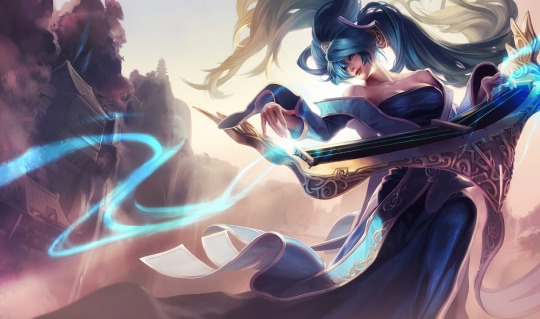
(Artwork by Shilin Huang. Made for Riot Games.)
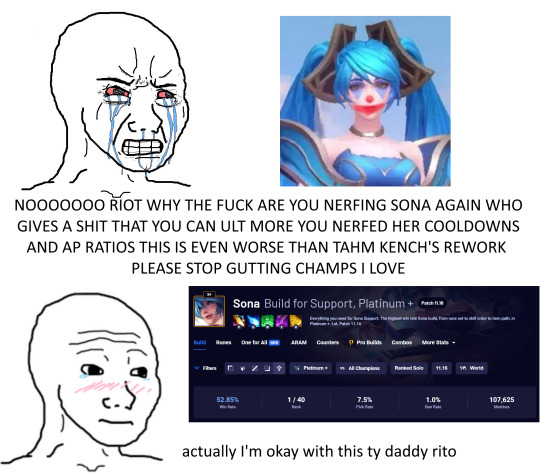
(Shit meme by yours truly.)
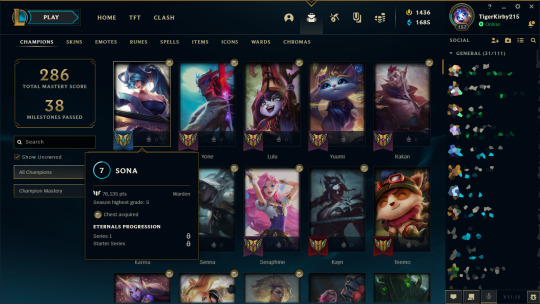
Revealing my Champion Mastery just to say that I play a lot of Sona. Don’t flame me for playing Seraphine and Yuumi I swear to god, and I have no idea why Teemo is in my top 10 highest mastery champs ngl.
Anyways you have no idea how happy I am as a Sona main that my girl is now top tier. I came to League of Legends from Overwatch (yes really) and I used to main Lucio in OW along with some of the more “techy” characters like Symmetra and Torbjorn. (Came to OW from TF2 where I mained Engineer and Medic.) Sona was a natural fit for me as a champion who was both easy to play and very similar to Lucio. It also helps that I joined the Rift during the single most engaging meta to ever grace this game. I was kinda too shit to play Janna but the Ardent Censer meta is also why I have such a high mastery on Lulu tbh.
youtube
But enough about my history with League: Sona! Honestly when I think of an archetypical support Sona pops into my head a lot sooner than Soraka: a champion based on empowering their teammates in as many ways as possible with heals, shields, movement speed, and CC to hold the enemy team down. I’ve always loved playing her because she feels like much more of a macro oriented character than other supports, with team-wide support as opposed to keeping one person alive like Soraka or Yuumi or focusing on CC like Morgana and Nami.
I’m going to build most if not all the champions eventually but man I am happy to tackle Sona now. She’s always been on my mind as my main but it was pretty difficult to think of how to make her. I think this build is good enough though!
Wow that was much longer of an intro than I’m used to. You can really tell which champions I’m excited for lol.
GOALS
Everything in harmony - Sona boosts everyone on her team with her songs as they fill the air.
Triple time! - Sona’s ability to boost her whole team into a good position is always beneficial.
Crescendo! - Fun fact: Sona’s ultimate is canonically extremely painful as she forces you to contort your limbs against your will. Why is Sona needlessly macabre? Well remember that Riot also wrote Volibear as an Eldritch old god.
RACE
Sona is Human but if you want to be cool you can make her a Kalashtar for resistance to Psychic damage and advantage on Wisdom saves. Regardless we’re going to be making what’s known as a dollar store Kalashtar with Variant Human. Increase your Charisma by 1 as well as your Constitution because we kinda don’t need much else. You also get proficiency in one skill of your choice which will of course be Performance, and a language which you can pick as you fancy: you won’t be speaking it anyways lmfao.
That’s because “Only you can hear me summoner; what masterpiece shall we play today?” Grab the Telepathic feat to complete this dollar store Kalashtar package. Increase your Charisma score by 1 and get a 60 foot telepathy to speak while being mute. You also learn the Detect Thoughts spell and can cast it once without using a spell slot. "Did he want... four autographs? I don't understand."
ABILITY SCORES
15; CHARISMA - Charisma is tied to performance and all the other stuff a Demacian noblewoman is expected to be good at.
14; DEXTERITY - Something something medium armor; even if you wear a dress there’s no reason you can’t have some padding beneath it!
13; STRENGTH - Hey this isn’t something something medium armor!
12; CONSTITUTION - Sona may be squishy in League but I value not dying more than good skill checks honestly.
10; WISDOM - Speaking of not dying: Wisdom saves are more common, and Insight is more useful than most Intelligence skills.
8; INTELLIGENCE - We had to dump something so unfortunately Intelligence gets the short end of the stick. You may have studied under the illustrious Buvelle family but most of those lessons were music classes.
If you want a better stat array going 13 / 14 / 12 / 10 / 10 / 14 with Point Buy is perfectly viable, and if your DM is cool enough to let you multiclass without Strength then you’re more than welcome to dump it.
BACKGROUND
There’s two obvious backgrounds that fit Sona: the first is Entertainer for proficiency with Acrobatics and a skill of your choice (since we already took Performance lol.) You also get proficiency with Disguise Kits and your Etwahl! (That’s what Sona’s instrument is called btw.) Your background feature By Popular Demand allows you to play any stage once. "Some, just the once.” You can perform in exchange for a place to stay, and when you do so the local people will remember your wonderful performance!
But making an Entertainer Bard is kinda cliché, no? If you want to lean into Sona’s Demacian heritage go for the Noble background. This gives you proficiency with Persuasion and History as well as a gaming set of your choice: unfortunately Tellstones isn’t an option (unless your DM decides otherwise!) so a Dragonchess Set will do well enough. Oh and you get another language that you won’t speak: fun! Your Position of Privilege makes it easy for you to arrange meetings with other important people, and the commonfolk will be kind and cordial with you.
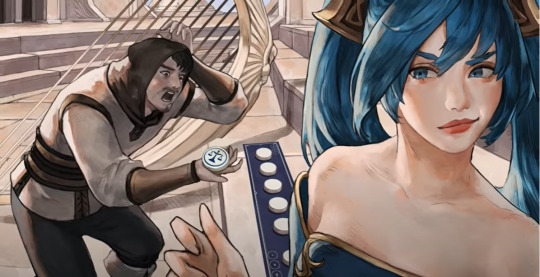
(Screenshot from the Tellstones: King’s Gambit trailer by Riot Games.)
I personally opted to go for Noble when making this build, but if you want to choose Entertainer go right ahead! Backgrounds don’t affect too much overall and it’s up to you (and your DM) to make your own Sona!
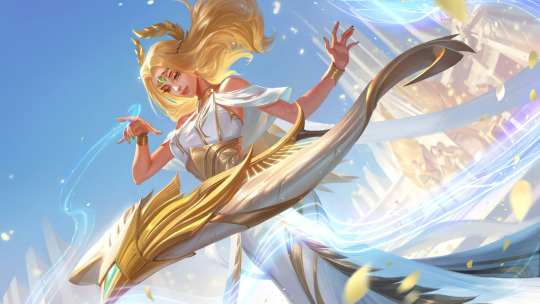
(Artwork from League of Legends Wild Rift. Made for Riot Games. RIOT PLEASE UPDATE MUSE SONA ON PC I’M BEGGING YOU!)
THE BUILD
LEVEL 1 - BARD 1
I mean what else did you expect? Bards get proficiency in three musical instruments of their choice: a Lyre is the closest you’ll get to Sona’s Etwahl, though a Dulcimer is also pretty close. I’d also recommend grabbing a Lute since most magical instruments come in Lute variety.
You also get proficiency in 3 skills of your choice like Perception to watch wards, Insight to watch people, and Athletics for a bit of Tenacity to break out of grapples. (As well as potentially grab some people yourself! Although Acrobatics is also perfectly fine for escaping grapples.)
As a Bard you can boost your ADC with Bardic Inspiration, letting them add a d6 to attack rolls, ability checks, and saving throws. You have a number of these equal to your Charisma modifier and they come back after a Long Rest.
But of course the main reason to play a Bard is to do Demacian-banned Spellcasting! You learn two cantrips from the Bard list like Vicious Mockery for some diminuendo, making it harder for the enemy to hurt your allies while also cutting them down to size. (I don’t know if your DM will let you slap your Etwahl angrily and then point at them judgingly, but you may have to break your vow of silence every now and then.) You can also learn Prestidigitation for all sorts of general magic stuff that you really shouldn’t do in front of anyone important.
You of course also learn 4 Bard spells like Cure Wounds and Healing Word for the atypical healing spells, Dissonant Whispers for some Hymn of Valor damage, and Detect Magic which you’ll likely be expected to cast as the designated support. *Sigh* Always gotta buy wards.
LEVEL 2 - BARD 2
Second level Bards could be called a Jack of All Trades, as you get to add half your proficiency bonus to any skill you aren’t proficient in. This means even if your ability scores are bad the skills you don’t have proficiency in are still good enough! You also get Song of Rest, letting your allies recover an extra d6 of health during Short Rests. And if you have Tasha’s Cauldron of Everything Magical Inspiration will let your allies add their Bardic Inspiration to the damage or healing of a spell they cast!
And finally you can learn another spell: against as the designated support you’re expected to take Identify.
LEVEL 3 - BARD 3
Third level Bards get Expertise in two skills: Performance is an obvious must and Persuasion would probably be good as well.
But more importantly you get to choose your Bardic College and if you want to both shield your allies and speed them up look no further than the College of Glamour! That’s because Mantle of Inspiration grants 5 temporary hitpoints to a number of creatures within 60 feet of you equal to your Charisma modifier (which can include yourself by the way!) Additionally those creatures can move up to their movement speed as a reaction without provoking opportunity attacks, making this a great tool to reposition an ally who’s caught in a dangerous position!
You’re also capable of creating an Enthralling Performance: if you perform for at least 1 minute, you can attempt to inspire wonder in your audience. At the end of the performance you can choose a number of humanoids within 60 feet of you who watched and listened to all of it, up to a maximum equal to your Charisma modifier. Each target must succeed on a Wisdom saving throw or be charmed by you.
While charmed in this way, the target idolizes you, and speaks glowingly of you to anyone who talks to them. They also hinder anyone who opposes you, although they avoid violence unless it was already inclined to fight for you. This effect ends on a target after 1 hour unless they take any damage, you attack it, or it witnesses you attacking or damaging any of its allies. If a target succeeds on its saving throw the target has no hint that you tried to charm it, and you can use this ability once per Short or Long Rest.
Finally you can learn second level spells like Hold Person, for a one-man version of your ultimate.
LEVEL 4 - BARD 4
Ah the first of many Ability Score Improvements. You may have noticed our deliberately uneven Charisma modifier: that’s because I’m going to be taking the Fey Touched feat for +1 to your Charisma, the Misty Step spell (for Flash, of course), and the Gift of Alacrity spell from Explorer’s Guide to Wildemount for a Song of Celerity! Accelerated movement? I concur.
You can also learn another spell as well as another cantrip! For your cantrip take Mage Hand for help warding those hard-to-reach areas, and for your spell take Lesser Restoration, because yeah it’s also your job to buy Mikael’s. *Sigh.*
LEVEL 5 - BARD 5
5th level Bards get a Font of Inspiration that lets their Bardic Inspiration come back after a Short Rest as well as a Long Rest. That’s good because your Bardic Inspiration increases to a d8, which also boosts your Mantle of Inspiration to grant 8 temporary hitpoints!
You can also learn another spell like Hypnotic Pattern: while it won’t do any damage and your allies can’t hit the dancing enemies it’ll still be the best recreation of your ultimate for now.
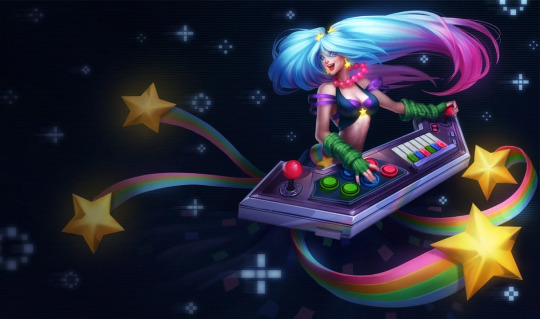
(Artwork by Katie “TeaTime” De Sousa. Made for Riot Games.)
LEVEL 6 - PALADIN 1
I hope you weren’t expecting this to be a pure Bard build, because then I’d just be building Seraphine again! Grab your something something Medium Armor as well as a shield (well technically you need both hands free to play a musical instrument) it’s Paladin time, master of auras!
Paladins get a Lay on Hands pool equal to 5 times their Paladin level for some more healing. You can touch a creature to give them any amount of health from your Lay on Hands, or use 5 hitpoints from your Lay on Hands pool to neutralize a poison or disease affecting them. You also get Divine Sense to locate any Celestial, Fiend, or Undead as long as they’re within 60 feet of you and not behind total cover. Don’t worry it gets a lot more exciting later.
LEVEL 7 - PALADIN 2
Second level Paladins can choose their Fighting Style and you’re still more of a mage than a warrior, so Blessed Warrior will give you two cantrips from the Cleric list that use your Charisma! Guidance is an obvious must for a support and Toll the Dead is a great option if you want to go full AP.
Should you have options for attacks to target enemies who have high Wisdom? Yeah probably: Sacred Flame might be a good choice.
Of course cantrips also imply more Spellcasting! You can prepare a number of spells equal to your Charisma modifier plus half your Paladin level (rounded down) which is currently a freaking lot of spells. Let’s just go down the list, shall we?
Bless is great to buff your team and make them harder, better, faster, and stronger.
Command is a mostly harmless Enchantment spell that will force your foes to do as you, well, command. I’d argue “dance” is a reasonable Command.
Protection from Evil and Good is never bad to have in your back pocket in case you’re fighting either Kayle or Fiddlesticks.
And Shield of Faith will let you boost your ADC’s survivability with Ardent Censer!
I know you can prepare more spells but there isn’t much I want from first level of Paladin. I am contractually obligated to mention that you can also turn your spell slots into a Divine Smite if you hit an enemy with a melee weapon, but you aren’t really going to be using weapons in this build. That’s right boys hop aboard the caster Paladin train!
LEVEL 8 - PALADIN 3
Third level Paladins get to choose their Sacred Oath and Oath of the Watchers may seem weird but it’s really good at defending your allies. That’s because you get two different Channel Divinity options: Abjure the Extraplanar works similarly to the Cleric’s Turn Undead feature except it affects Aberrations, Celestials, Elementals, Fey, and Fiends.
Watcher’s Will meanwhile lets you choose a number of creatures you can see within 30 feet of you, up to your Charisma modifier. For 1 minute, you and the chosen creatures have advantage on Intelligence, Wisdom, and Charisma saving throws. This means that in a party of 6 this ability can give your whole party advantage on all mental saves, which is huge for keeping everyone alive against nasty casters! See? Demacia can use your magic!
Speaking of magic you get Alarm and Detect Magic as Oath spells. (Might want to swap Detect Magic from your Bard list with Mass Healing Word ty Tasha’s.) You can also use Harness Divine Power to regain a spell slot equal to half your proficiency bonus a number of times per Long Rest. And you get Divine Health, because you don’t take a sick day to stop complaining about Seraphine.
LEVEL 9 - PALADIN 4
4th level Paladins get another Ability Score Improvement: cap off that Charisma for maximum AP scaling!
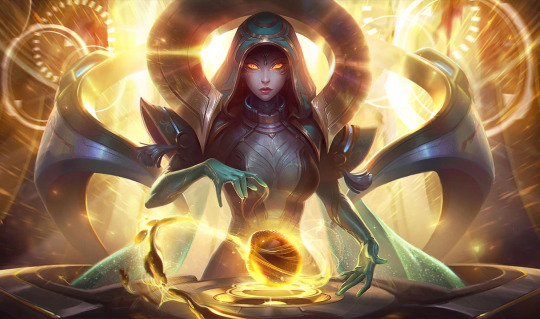
(Artwork by Kelly Aleshire & Esben Lash Rasmussen. Made for Riot Games.)
LEVEL 10 - PALADIN 5
5th level Paladins can finally prepare second level spells! As a Watchers Paladin you get access to Moonbeam as well as See Invisibility, both of which are very good for dealing with incoming gankers.
You can also prepare spells like Aid to boost your allies’ HP, Prayer of Healing (ty Tasha’s) for some out-of-combat healing, and Warding Bond for a Knight’s Vow.
Oh and you get an Extra Attack, which sure would matter if you were actually using weapons.
LEVEL 11 - PALADIN 6
6th level reasons get the main reason Sona’s a Paladin: Aura of Protection! All your saving throws are increased by an amount equal to your Charisma modifier, which is a full +5 currently! But what’s special about this ability is that it also applies to your allies within 10 feet of you, letting you give out auras a plenty to keep your allies safe!
You can also prepare another spell but again: not much I really want. So we’re going to be waiting a little while longer once again.
LEVEL 12 - PALADIN 7
7th level Watchers Paladins get Aura of the Sentinel, or as I like to call it: Song of Celerity. When you or any creature of your choice within 10 feet of you roll for initiative, they gain a bonus to initiative equal to your proficiency bonus. While this may make positioning a little difficult (everyone’s going to have to huddle around you) this ability guarantees that you can speed up all your important allies to make sure they get their powerful abilities off!
LEVEL 13 - PALADIN 8
8th level Paladins get another Ability Score Improvement or a Feat. You may have noticed your uneven Constitution score: grab good ol’ Resilient Constitution for a boost to your health and even more insurance on your Concentration checks. With your Paladin aura and proficiency you’d have a +12 total to your Constitution checks currently, meaning that if you take 24 damage or less you won’t even have to roll for Concentration!
LEVEL 14 - PALADIN 9
You are probably the only Paladin who cares about spells, so it’s nice that you get 3rd level spells now! Watchers Paladins get two very strong third level spells: Nondetection will help you deward and keep your allies safe from enemies that may try to sneak a peak at you, but Counterspell is the true best choice to stop danger from befalling your allies. What’s very good about Counterspell is that as a Bard you get to add Jack of All Trades to the skill check, meaning it’s far easier for you to deny an incomming spell than any other spellcaster! “Mages have enough problems without you.”
Of course you can prepare some more spells like Aura of Vitality for Aria of Perseverance, and Revivify for an ADC’s Guardian Angel. But having access to spells like Remove Curse, Dispel Magic, Crusader’s Mantle, and even Daylight on the Paladin spell list are all extremely useful to be able to prepare. Remember that you are doing yourself a disservice by not taking time to think about what the best spells to prepare would be for your current quest. "Every note is important."
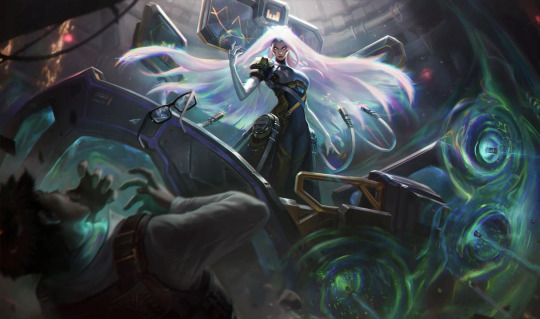
(Artwork by Kelly Aleshire & Esben Lash Rasmussen. Made for Riot Games.)
LEVEL 15 - BARD 6
Now that we’ve got all our auras it’s time to go back to Bard for Mantle of Majesty! As a bonus action, you cast Command without expending a spell slot as you take on an appearance of unearthly beauty for 1 minute. During that minute you can cast Command as a bonus action on each of your turns without expending a spell slot. Additionally any creature charmed by you automatically fails its saving throw against the command you cast with this feature. You do have to concentrate on this feature (like a spell), and once you use it you can’t do so again until you finish a long rest.
You can also learn another spell but there isn’t much I want from the third level of Bard, really. Oh and you get Countercharm which is awful and I hate it, but since you didn’t take a 10th level in Paladin I suppose you have to use it. Spend an action to give allies advantage on their saving throws against charms and fears, I guess.
LEVEL 16 - BARD 7
7th level Bard; 4th level spells. Freedom of Movement will let you help either yourself or an ally with Mikael’s Crucible, and Dimension Door is great to get into lane fast, or back to base fast!
LEVEL 17 - BARD 8
8th level Bards get another Ability Score Improvement, and if you don’t like the look of something something Medium Armor then the Eldritch Adept feat might be able to help. Take the Mask of Many Faces invocation to be able to cast Disguise Self at will to change your skins as you please.
Could you have taken this earlier? Absolutely. Are there better invocations? Yeah probably, but by level 17 you can make some of your own choices. Build your own Sona: this is merely a guide and you can make your own choices.
Speaking of own choices: take whichever spell you want at this level. There’s plenty of great ones for a 4th level Bard and I can’t recommend anything in particular to you. Every musician has their own style, and it’s up to you to find your own!
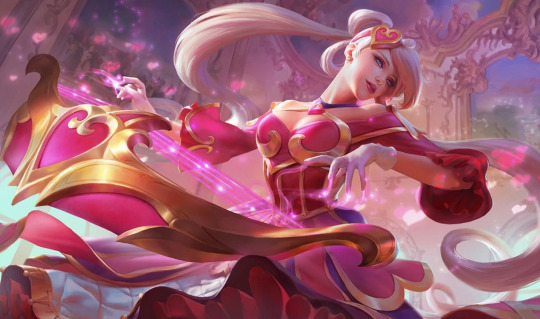
(Artwork by Yan Li. Made for Riot Games.)
LEVEL 18 - BARD 9
9th level Bards get to pretend that increasing Song of Rest from a d6 to a d8 by total level 18 is helpful.
You do get access to 5th level spells like Mass Cure Wounds, which is like Mass Healing Word but better! "Harmoniously."
LEVEL 19 - BARD 10
10th level Bards get Expertise in two more skills: Perception is an obvious must to watch over your wards but beyond that? Honestly pick your poison with whatever skill you want since by level 19 you can make your own choices. (Though my personal choice would be Athletics to hopefully give some more safety against grapples.)
But of course the main boon of reaching level 10 in Bard is the Magical Secrets! ...I’m afraid I’m going to have to disappoint you again: there honestly aren’t any spells in particular I want as Magical Secrets. Sure I could recommend spells like Haste or whatever but are they really going to be that great by total level 20? To be honest even the spells on the Bard list like Animate Objects, Greater Restoration, Hold Monster, Rary's Telepathic Bond, Scrying, and Synaptic Static are very good (although I’d sooner replace some of your old spells with them.)
Again I know this is supposed to be a “guide” but most people won’t hit level 19 anyways, so I don’t think it’s that bad for me to recommend you take your own steps to make your own Sona. Hell, build some AP if you want! I know I would!
LEVEL 20 - BARD 11
Our final level is the 11th level of Bard and I’ll be honest: it’s just to add Otto's Irresistible Dance to your spell list. It can only affect one person but it’s still your ultimate by total level 20.
Oh and you were supposed to get a cantrip last level. Uhhhhh I dunno take Mending lol.
FINAL BUILD
PROS
The rhythm connects us all - You have dozens of spells to keep your team alive and active during a fight, not to mention that all your Paladin auras and abilities really help them give 110%. It’s worth mentioning that Gift of Alacrity combined with Aura of the Sentinel is a d8 + 6 to an Initiative roll, which will almost always guarantee that whoever you want to go first will be going first!
A true masterpiece should celebrate living - Despite your somewhat weird level split you maxed out the only stat which matters for you: Charisma. And woah holy shit turns out Paladins are really good with maxed out Charisma! +5 to all saves means even your lowest save is a +4, and the saves your proficient in vary between +13 for Dexterity and Constitution (both very common!) and a whopping +16 save on Charisma!
Curtains up; I'm ready - Jack of All Trades also does quite nicely to help your middling skills. Even though I dumped most of your mental skills you’re still proficient enough that you won’t be completely helpless when caught off guard. And when you’re in the zone with Persuasion or Performance you are easily the best girl around!
CONS
Don't make me get off stage - It was my intention to recreate Sona’s positional gameplay with this build but it does present some gameplay issues when trying to maximize your effectiveness. Where do you position yourself as a character who’s still primarily a squishy caster despite your good saving throws and AC? Can you give everyone in your party support, or are they too spread out to get value out of your 10 foot range auras?
Quiet, please! - You have a damn good concentration check, but what do you concentrate on? Not only do you have a ton of spells but they all scale very good with levels and you have spell slots that go far higher than your maximum level spell. It can be hard to choose what to do with those 7th and 8th level slots.
The world is cruel... Until that changes, I'll never stop playing - One of many “meta” problems with this build was my choice to focus almost entirely on support. Sure Toll the Dead is a great damaging cantrip but your only two damaging spells are Moonbeam and Dissonant Whispers. Again: you don’t have to follow my build point-for-point and while you’ll be flamed in League for building Sona full AP I don’t think your friends will mind if you take some damaging spells.
But if you can’t tell it was really hard for me to come up with those downsides. With the exception of the positional requirements a Bardadin is a very strong build and Sona is a very strong support. Boost your teammates with your own amazing power and make sure everyone’s alive and jamming! Your power may have been forgotten over the years but no one’s ever upset to have a great support at their side. And remember: Seraphine may be in K/DA but you’re in Pentakill, and you have your own label! No one can replace DJ Sona!
youtube
#dnd#dnd 5e#dnd build#dnd guide#League of Legends#League of Legends Sona#Sona#Seraphine didn't replace her#shut the fuck up#dnd bard#dnd paladin#music#Youtube
34 notes
·
View notes
Text
Shi Mei, Mo Ran, and Injustice
I finally finished Erha, and…well. I’m not sure how I feel about it. I think there are a lot of interesting themes running through it regarding redemption and forgiveness and how do we determine what is just and what is cruel, and yet I feel that those ideas are never interrogated to the extent that they could be. The respective endings of Shi Mei/Hua Binan and Mo Ran leave me feeling a bit cold, mostly because both of their story lines directly touch on these themes and yet they don’t quite seem to know what they want to say about them? They’re just kind of left hanging?
(Fair warning, this isn’t really a structured meta and it doesn’t really reach any grand conclusions; it’s mostly me just rambling on about some thoughts I had.)
So, the atrocity within the cultivation world that really sets the novel’s entire plot in motion is the systematic dehumanization and exploitation of the Butterfly Boned Beauty Clan. The beauties are a race descended from demons that cultivators see as being good for only two things: serving as human cauldrons to increase cultivation (so basically, get raped so their rapists can increase their spiritual power) or being eaten outright or having their bodies harvested to turn into high-level medicines.
Hua Binan wants this to end. He wants his people to return to the Demon Realm, where they’ll have access to their spiritual power and won’t have to worry about being bred like livestock and cannibalized. The kicker is that doing so requires the Path of Martyrdom, which has to be constructed from the flesh, blood, and bone of so many people that it basically requires killing pretty much everyone in the world. One atrocity begets another; in order to save his people from murder, Hua Binan commits murder on a massive scale. And yet Hua Binan’s path is thematically similar to what Mo Ran did to his childhood tormentors—Mo Ran killed everyone in the Drunken Jade Pavilion, either with a machete or by burning them alive after he set the building on fire, and he didn’t discriminate between the ones who had directly harmed him and the ones who just happened to be there.There’s a definite parallel in how these characters are responding to violence with more violence, yet one of them is spared while one of them is crushed.
Just as Mo Ran’s actions led to his new life as a young master at Sisheng Peak, Hua Binan is about to achieve a new life within the Demon Realm. His machinations finally allow him to forge the Path of Martyrdom, the gates to the Demon Realm open, and the Butterfly Boned Beauties are allowed to go home. And then comes the kicker: Hua Binan’s father is descended from a god, and so he cannot be allowed to enter the demon realm. The doors to the demon realm begin to close, heedless of the beauties who have yet to enter (regardless of whether or not those beauties have any god blood!), and Hua Binan, desperate to save his people, pulls on his newly unlocked spiritual power to hold the doors open just long enough for the rest of his people to pass through to safety, then he’s brutally crushed.
On the one hand, it’s easy to say that Hua Binan got what he deserved. The Path of Martyrdom was brutal, built on the blood and bone of everyone regardless of whether they deserved to be sacrificed or not (and who can possibly be the judge of that?), and Hua Binan has responded to the genocide of his people by instigating another genocide. He shouldn’t be rewarded for killing everyone in the world, and his choice to die for the sake of his people but not reap the benefits of mass murder is fitting.
But if Hua Binan gets what he deserved, then I have trouble with how Mo Ran’s story line plays out. Their death scenes are remarkably similar: Mo Ran/Taxian Jun maintains the Black Tortoise Spirit Foundation in order to allow the cultivators to pass through the Gate of Time and Space and Life and Death to safety, just as Hua Binan held open the door to the demon realm to allow the beauties to pass through; and just like Hua Binan’s body was slowly crushed by the closing doors, his own body slowly dissolves into dust. Both of them sacrifice themselves to ensure the safety of others.
Yet Mo Ran is ultimately spared. He’s spared because he was a Butterfly Boned Beauty all along, even if he didn’t know it—because of course, he’s a super special Butterfly Boned Beauty who didn’t have the physical giveaway of crying golden tears but has the ability to cultivate an incredibly strong golden core. There’s something about this that just feels a bit too neat and tidy. Mo Ran is a Butterfly Boned Beauty, but he can safely pass as a regular cultivator and didn’t feel the same fear that constantly tore into Hua Binan. Mo Ran can stay within the Demon Realm, embrace his heritage as a Butterfly Boned Beauty, and live an extended lifespan because he did so much to aid the beauties. And yet, everything that he did for them—the Forbidden Techniques, the creation of chess pieces to create the Path of Martyrdom—was ultimately done at the behest of Hua Binan. Mo Ran has never dedicated himself to the cause of the beauties to the same extent that Hua Binan did and has never taken their cause as his own. He felt bad for Song Qiutong at the auction, but we never really see him engaging with the systematic exploitation of an entire group of people outside of this incident.
And Mo Ran’s grace isn’t based on an idea of morality being rewarded. The Demon Realm doesn’t care if he killed a bunch of people under someone else’s control or not; it doesn’t care if he killed people at all, as long as it’s done for a purpose the demons agree with. Mo Ran being a beauty feels like a deus ex machina in the worst sort of way, a last minute addition to tie the plot work even if it isn’t thematically integrated.
And Shi Mei? The last one of the Butterfly Boned Beauties who were exploited for so long, who lost his eyesight and didn’t return to the Demon Realm? The last we hear of him, he’s wandering the world as a blind cultivator, living a life of atonement, calling himself a sinner, and healing others with his own flesh. Did he get what he deserved? He let Chu Wanning go and dedicated his life to helping others, but is he truly free of the fear that has followed him his entire life? If word gets out that he’s the last beauty, will he be hunted down and harvested like his kin, even after everything else he’s done? We don’t know.
And that’s the thing: we never find out if the rest of the world ever reckons with the harm it’s done to the Butterfly Boned Beauty Clan. Honestly, one of my biggest frustrations with the beauties is that they are the point around which the entire plot revolves, and yet there is so little time actually spent on them—we get Song Qiutong’s auction scene, Hua Binan’s info dump to Chu Wanning, and that’s pretty much it. One of the questions that I feel that Erha could have really engaged is if genocide really needs to be responded to with genocide—were there other options that the beauties could take?
Erha rests on a backdrop of societal injustice and exploitation, and yet it never commits to actually addressing it. It’s leaving me frustrated. It’s such a big question, and yet it never really asks the readers to engage with it. Mo Ran is forgiven! Hua Binan gets his comeuppance! Shi Mei is...who knows! It’s wrapped up so neatly, when these themes are anything but neat.
#erha#2ha#dumb husky and his white cat shizun#hua binan#shi mei#hua binan was a villain but he had a pretty good reason to want to burn the world#it was a pretty terrible world anyway
118 notes
·
View notes
Note
◈ ◈ ◈ ◈ & ღ & ♫ bc ur a slut for music ; & ✮ (i want explanaTIONS ...gET META W THIS SHIT )
◈ — share some head-canons you have for a muse of your choosing, but x4.
[ elijah kane ] ◈ — all efforts to get him into studying how to make robotics like hyacinth have resulted in a lot of miniature woodland creatures able to sprint across desks. it’s not exactly what anybody had in mind, but hey, you never know if ilya might not want to send in an actual animal for something he has going on. they can call up sugar kane industries ( big face-palm here ) to take care of the job. ( wyatt voice: seriously, you couldn’t think of anything better than sugar kane. ) / hyacinth kane has a nice ring to it. elijah has tested out several different nicknames: sugar kane also for them, mistah k, ( missus k? ), cinthy ... cindy ... ( sean: yeah! cindy k! like cindy crawford! / who the fuck is cindy crawford? / wyatt — / how old are you. ) / he’s had a life-long dream to be able to go scuba-diving off the coast of — some exotic island he can’t remember the name of. beforehand, it was one of those things that he was too afraid to do, but full-out war changes your perspective. in truth, he’s always been a water baby, growing up going swimming in the local rivers and running pellmell down the dirt lanes. he grew out of it, and then grew back into it. whether or not he’s going to be able to do that without monroe tagging along ( and then by default, ilya, and then probably hojin will want to come, and then ravi will have to, and then oliver will want to watch over them and then jinho will buy a whole yacht with his dumb vampire money — ) — ah, well, there’s worse people to spend an extended holiday with. his father will come along too: sit on the deck in a lawn chair and drink a virgin margarita as he deserves after putting up with this whole extended family. and with his son being a you-know-what.
[ alice bedi ] ◈ — there was a time where she was interested in wigs. she had percival sit down on her shack’s bed and watch as she perused through at least fifteen different styles of wigs. each one got a firm head-shake: too rough on your complexion; lilac looks good as a colour, but the style is horrid; why did they think it was a good idea to make a bob that length? a tough customer. she returned back to wearing veils, her preferred style being that of mantilla, or the veil that’s worn to chapel over a jade comb. due to the volume and length of her natural curls, she rarely wears the combs at all, but will if it’s a particularly formal occasion, like that time she accompanied percival to a ‘high-society event.’ ( translation: they crashed a party because he was bored, and she had a bad feeling about him going alone. ) / as the local librarian’s assistant, she’s the first to get in the way when someone is overtly curious: why are you asking so many questions? hmm? the irony is that she herself asks just as many questions — she insists that the difference is: she reads the room and knows when it’s inappropriate to ask them. ( and if she knows it’s inappropriate to ask them, and instead chooses to risk asking them regardless, it’s because she knows it’ll smooth out in the end. / despite what she wears daily, one of her most favourite colours is moss green. there are a multitude of reasons. moss is her favourite foliage. it’s similar to algae, another favourite foliage. and it reminds her of someone who she says is her sister; however, anybody who knows her, knows that she has no blood-siblings. one or the other might be a lie, or both might be the truth. when she’s in a mood, she’ll smear the moss at the base of her neck like a perfume, a splotch of green beneath white.
[ huang shen ] ◈ — he designed an irrigation system to work, specific to his farm, to be able to make rice paddies despite the surrounding environment. it’s a southern crop in the united states, but there was no way he was going to move to the south just to expand the business. his entire family was so relieved about it that they danced through the sprinklers and set off fireworks — and none of them are really into that kind of thing. it’s particularly incredible due to the area they’re in, being very prone to sometimes too much drought and too much rain, and both are responsible for driving out selling numbers of crops. his plan is to switch into an agricultural degree, and perhaps even expand it into engineering, so that he can continue helping this way. / one of his surprises for algernon was learning sign language. for the longest time, months even, shen made it out like he had no idea what was being said, and let damien, as surly as ever, be the translator when algernon was unwilling or unable to speak. in the background, however, he was working with a tutor and seeking to understand better what it meant to be both HoH and mute. then, when algernon’s birthday came around, everyone went silent ( holy god he was so nervous ) and he gave an entire romantic, long speech entirely in sign language. he’s sure that some of it got lost in translation due to how hard his hands were shaking, but the way that algernon kissed him afterwards, it didn’t seem to affect much. now, they communicate constantly on this even ground. / he’s started up horseback riding again — and has roped tobias into doing it alongside him. tobias might have grace on the stage floor, but certainly not on the back of a horse; he somehow ended up upside-down beneath the horse’s belly, and then fell down in a tangle of limbs. shen has taken to the western side of things, re-learning how to barrel race and rope cattle; but he and tobias have had to separate their lessons due to these antics. lucas isn’t allowed to come to any of them; his stupid remarks send them into fits of laughing. ( bold of us to assume he doesn’t just sit in the truck and shout anyways. )
[ deok bae ] ◈ — due to the empire no longer supporting his upgrades, nor looking in his general direction, he has had to find other ways to obtain new modifications. this is including, but not limited to, going and pulling them out of other people’s bodies as catharsis — but usually, he defects to yuri and silas to fix him up. to his chagrin, the LED-light in his forehead has absolutely no use whatsoever, only displaying his brain’s processing as a symptom of installation. he pulled it out himself via the tip of a knife’s blade. the next time that he’s seen by those who haven’t seen him in quite some time, he might be unrecognisable. i am not deok bae — perhaps deok bae is no longer himself either. if there was no connection to eli in his head, he would forget that; perhaps he would merely succumb to the machinery, perhaps he would succumb to the wolf-dom. there are several pairs of teeth in his mouth awaiting for their moment to bite. / when he was a teen, his version of ‘sneaking out’ would be to wheel his chair to the gardens at the back of the temple, where he would sit and think for hours and hours. his father would come and find him there; sometimes, master jhcor would instead. his father would return him back to where he needed to be, but master jhcor would sit beside him and gaze serenely until bae felt the need to speak what was on his mind: his angers, his fevers, his rages. one time, he was surprised to see that it was not master jhcor, nor master deok, but zan coming to sit with him. his heart had sat in his throat the whole time, half-expecting zan to laugh at him or say something particularly piteous. instead, the conversation was — well, looking back, absurdly normal, all things considering. when bae blinked tiredly, zan rose and took the handles of his chair and took him back. he hadn’t intended to ask him to do so, but it was done anyway. / bae drinks a lot of soda. it’s somewhat fitting, if you believe all that talk about how coca-cola can double as a cleaner due to the high carbonation and way it’s made. he does seem to get shiny after several cans — it’s also convenient that he can’t experience sugar-highs nor malfunctions of the liver or stomach due to too much consumption. he considers himself to be a soda connoisseur as a result. he offers a lot of hmm, that’ll taste disgusting comments that annoy the shit out of the others — but then kisung takes a drink and bae ends up being right, so there’s no regrets.
ღ ━ favourite canon ships for your muse(s). are there any you dislike?
there’s ... none that i dislike. there’s moments of come on, but that’s bound to happen. i think the favourite ships are the ... guardian / princess vibes ( whether it’s literal or not: akane / the samurai, quinn / sehrin, jian / elaine ). i also love the growing from previous immaturities towards each other ( grey / tobias, jihoon / wyatt, playboy / jordan ) — and himbos of course ( hojin / ravi!! ) there’s also the whole ... tsh, vampiric aesthetic that we get ( minzhe / yongha ) ... the ones like jisoo / mingfei, cyrian / ulysses, cadoc / pestilence ( exploring violence against but without the stickiness ). of course, if i keep going, i’ll end up listing all of them and then where would we be.
♫ ━ a small playlist for a muse of your choice
for nam jungsoo, because i actually once did make a playlist for him:
1. brand new — sic transit gloria ... glory fades 2. within temptation — what have you done 3. iamx feat. imogen heap — my secret friend 4. florence + the machine — shipwreck (the odyssey) 5. crown the empire — hologram
i mean, the songs are still kinda relevant considering his current character ...
✮ ━ top three favourite muses that you’ve played
but is it possible to pick three favourites ... that’s the real question. maybe. jianguo, because of catharsis, because of cultural exploration and similarities. grendel, because of the depth, the personal torment, the surrounding family. jinho & julius, because of exploring that darkness. and famine — man, now that’s something. there’s a lot more than three though. like blood and jisoo and tobias and arthur. but. the questions INSIST THAT I CHOOSE.
4 notes
·
View notes
Text
An Angel, and Lucifer’s Kid? Queer-Coding and Dean’s “Found Family” in 14x13 Lebanon
It’s time for some unashamed, LGBTQ subtext-reading Supernatural meta to celebrate Valentine’s Day!

“What, you think you have some kind of special buzz-bedar or whatever?”
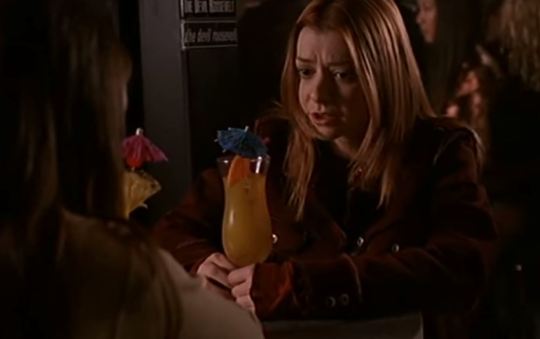
(Willow and Kennedy at The Bronze in The Killer in Me, 7x13)
Well.... yeah...
Because this conversation... in which John said he wished for “a normal life” for Dean...
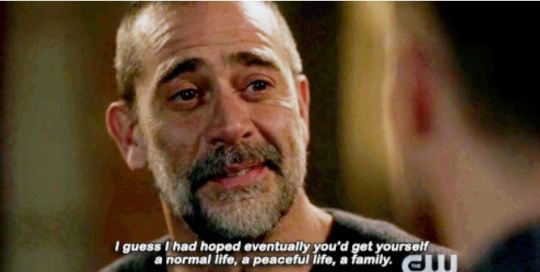
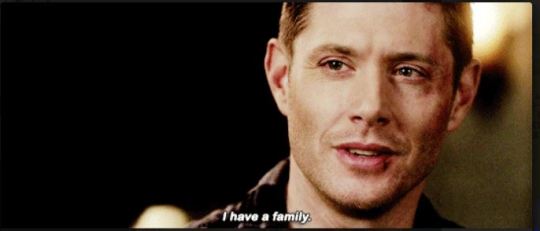
See the original gifset here:
https://hellgracer.tumblr.com/post/182652253539/thats-right-you-do
This conversation? Pings, hard, for LGBTQ folk....
Here is Ellen’s character on her ground-breaking sitcom, coming out to her parents in 1994 ... (Ellen 4x4 Hello Mudder, Hello Fadder):
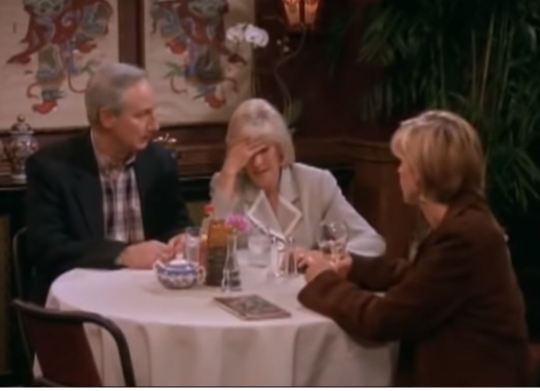
ELLEN: “Please understand, that for the first time, I am really, really, happy.”
ELLEN’S DAD: “Oh, so now you’re saying you had a lousy childhood? Your brother Stevie had exactly the same childhood and he turned out perfectly normal” [my italics].
There’s that word.... normal.
Do you remember the title of Larry Kramer’s 1985 play about the HIV/ AIDS crisis in New York (later a 2014 TV drama starring Mark Ruffallo and Matt Bomer)?
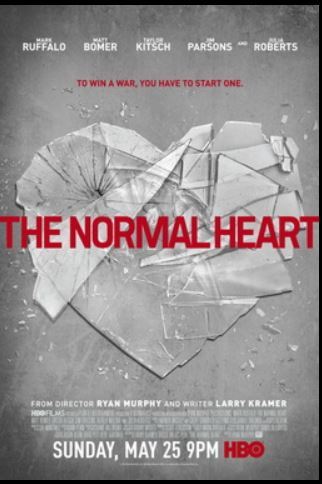
The American Psychiatric Association’s Diagnostic and Statistical Manual removed homosexuality from its list of “mental disorders” in 1974 (after concerted activist efforts). Before that, homosexuality was officially classified as a psychological “abnormality”.
Here’s more on the history of that classification and its removal:
https://www.ncbi.nlm.nih.gov/pmc/articles/PMC4695779/
So that word “normal” (that refrain, “Why can’t you be normal? I want a normal life for you, a normal family...”) resonates in LGBTQ history.
And when Dean has the above one-on-one conversation with his father, the ghost of John Winchester, pulled-out-of-time, there’s a resonance there (should you choose to accept it).
Notice it’s Dean who has this particular conversation with John, not Sam.
And of course, John is thinking about a heterosexual family, marriage to a woman and kids, like the family he had with Mary, way back when. That’s the default assumption for a guy like John, right?
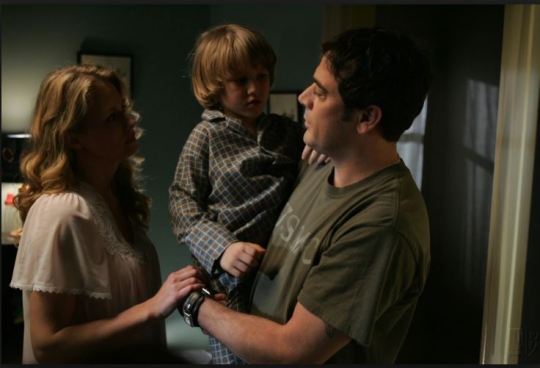
So when Dean answers, “I have a family,” the narrative (given John means a wife and kids - he already knows Dean has his brother) substitutes Castiel and Jack into those negative spaces.
Here they are, Dean’s brother, Dean’s angel and their adopted kid, taking care of said kid at the hospital (as families do) (14x07 Unhuman Nature)

“Found families” which don’t look nuclear and hetero-normative (a significant element of the awkward hospital check-in scene in Unhuman Nature) have been, and continue to be, a significant feature of LGBTQ life, because despite advances in rights and societal acceptance (in the US, where SPN is set) many continue to be rejected by their birth families:
https://www.vice.com/en_us/article/ywbkp7/why-queer-people-need-chosen-families
https://www.bfi.org.uk/news-opinion/news-bfi/features/families-gay-lesbian-transgender-queer
I’ve argued previously that the Ma’lak box (now officially dubbed, by some wags in this corner of the fandom, the Drama Coffin TM) stands as a metaphor for Dean’s self-repression, and, in a queer subtext reading - for the closet:
http://drsilverfish.tumblr.com/post/182375754379/a-fridge-locker-an-enochian-puzzle-box-a-malak
I mean, Dean literally builds a box to lock himself inside, in a room full of sexy male pin-ups...
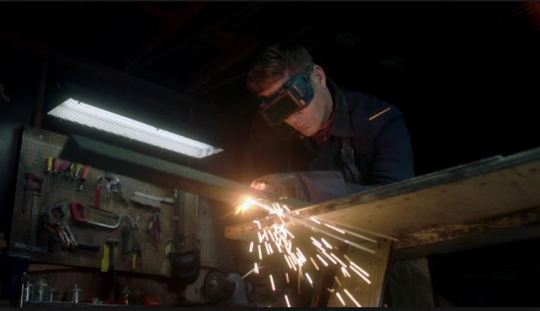
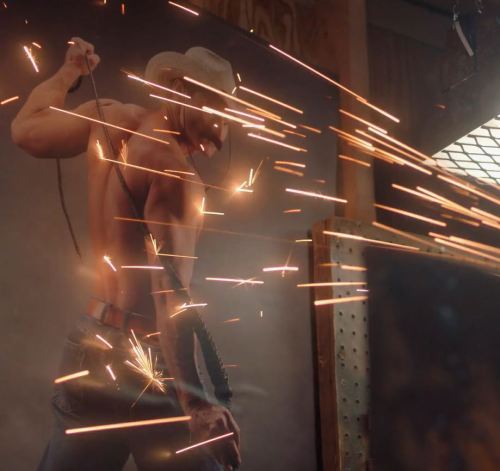
You have to work hard not to see that...
I’ve also argued previously that AU!Michael has been set up as a dark mirror for Dean’s self-repression/ the ghost of John Winchester (who is the source of Dean’s self-repression):
http://drsilverfish.tumblr.com/post/179226151009/queer-gods-and-monsters-14x02
http://drsilverfish.tumblr.com/post/182120562849/aumichael-and-the-closet
Now, let’s take a very close look at the moment John arrives at the Bunker in 14x13 Lebanon, with help from the Superwiki transcript:
http://www.supernaturalwiki.com/14.13_Lebanon_(transcript)
DEAN: “So, what do I…” SAM: “I don’t know. I-I guess you – you hold the pearl and – and concentrate on what your heart desires.” DEAN: “Michael outta my head. Got it.”
And then the lights go to red emergency and the looming ghost of John Winchester appears, punching both his boys to the floor and pointing a gun at them....
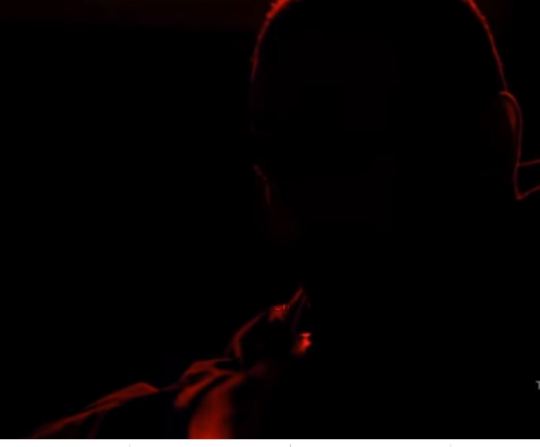
Do you see it? Do you see the transition?
Michael out of Dean’s friggin’ head IS (metaphorically) the ghost of John Winchester (who arrives to red warning lights, with violence and control) aka Dean’s self-repression. So when Dean is able to tell his father, who raised him to be a “good little soldier”, to shoulder parental responsibility for Sammy, to perform a certain kind of masculinity (muscle cars, classic rock, no chick-flick moments) aka to tell his own internal voice of self-repression, proudly that he has a(n unconventional) family - consisting of his brother (whom he “practically raised”) his angel, and their adopted Nephilim son - well, we can argue that frames Dean (subtextually) as taking a step towards owning his queerness. Particularly as he later tells his brother, “I’m good with who I am.”
Here, have Cas holding a heart while Dean looks on in 5x14 My Bloody Valentine .
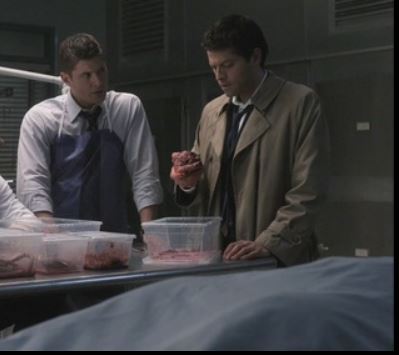
Do you remember Metatron’s angel-fall spell, back in S8?
1) Heart of a Nephilim (product of angel/ human sexual/ romantic congress)
2) Bow of a Cupid
3) Grace of an angel
http://drsilverfish.tumblr.com/post/50579065447/metatrons-spell-the-ingredients-spn-8x23-the
Specifically, bow of a Cupid who had just helped two dudes fall in love whilst Cas and Dean looked on (narrative mirroring) in 8x23 Sacrifice:
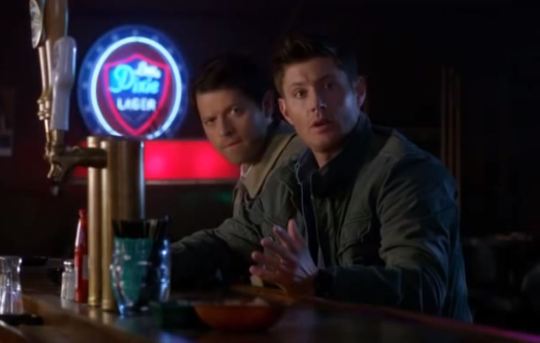
Specifically, Castiel’s own grace. And, yes, I’ve written a meta about how grace is figured as spunk sometimes in SPN here:
http://drsilverfish.tumblr.com/post/173619016494/spunk-of-an-archangel-13x21 )
If you think about those “angel fall” spell ingredients, they’ve (metaphorically) come to fruition in S14.
Dean’s found family contains: the heart of a Nephilim, in the form of his adopted son, Jack; the grace of Castiel, now living with them (finally) at the Bunker, following Cas’ own long journey after the angel fall. And Jack himself, who, as the offspring of a human/ angel pairing is a huge metaphor for human/ angel love (aka Cupid’s bow).
And when Dean destroys the pearl, which summoned AU!Michael (metaphorically) out of his head, in the form of the ghost of his father (aka his self-repression) - what happens when that has been faced and laid to rest? The time-line course corrects, and instead of the mind-wiped solider of Heaven, who didn’t know him, Dean gets “his” Castiel back, the one who loves him, his actual heart’s desire.
And... cue intense staring, Romeo and Juliette style, in a closing balcony scene:
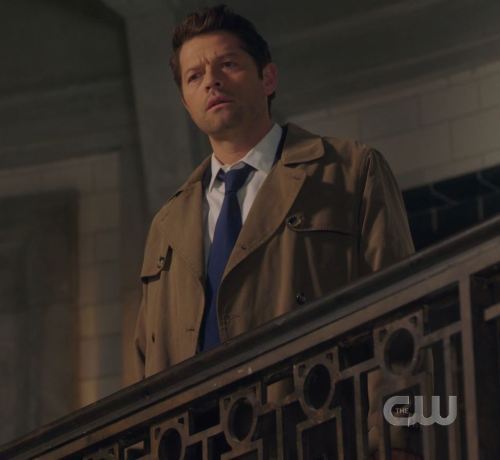

Happy Valentine’s Day 2019 Dean and Cas!
NB: Usual disclaimer - this narrative concerning Dean’s queerness can, and most likely will, continue to be told entirely in subtext, as it has been for 14 seasons now, and for 10 specifically in relation to Castiel - ever since Dean stabbed Cas through the heart at their first meeting in 4x01.
You can read more about what I think about the ethics of continuing to tell this story in subtext under my “Reading Subtext” tag.
#Supernatural#14x13#Lebanon#SPN meta#Meta#Dean is bisexual#Destiel#Still subtext#But subtext IS part of narrative
387 notes
·
View notes
Text
ainulindale meta (IV)
Index post here
Theme of the Children: Theodicy, Providence and Hope.
The Third Theme (T3), which I would call the "Theme of the Children", has a lot of parallels with T2.
Eru now shows a low-intensity but negative emotion for the first time, he's displeased or upset ("stern" semblance).
T3 gathers power like T2 but not in new beauty, rather in profundity.
We are told how the music is (deep, wide, slow) and how it is blended with "immeasurable sorrow" (a negative emotion, to match Eru's) - but told that this sorrow is also the source from which "its beauty chiefly comes". that's a lot to unpack, so let's go bit by bit.
The Discord now, explicitly violent (warfare - atrocity, pillaging, mass murder, conflict-related sexual violence if you squint once), tries to "drown" T3
we're also told how the Discord is, in contrast, in pejorative terms (loud, vain and endlessly repeated v deep, wide, slow) - and we're told something very meaningful about it, that reveals Melkor's hypocrisy and undoing:
the Discord has "little harmony but unity of its own" (a 'clamorous unison').
so not only does Melkor try to drown out T3, he unravels himself in his sub-creative actions (a Tolkienian concept meaning that he can alter and shape, but not create ex nihilo).
there where he has mastery or influence, he negates the very free will that spurred his initial quest for creation, and his rebellion during T1 and T2.
these are the actions of someone who does not value creation. Morgoth and Melkor are the same individual, but Morgoth the tyrant, the Black Foe of the Noldor, is not driven by his Melkorian nature.
I think this is what it means to be corrupt, to be fallen from grace. Judaism and Islam have a curious wording for penitence or repenteance that essentially means "Return"; who repents 'returns' to his nature. If you're corrupt from the get-go, you have nothing to return to, you're definitionally unredeemable.
However, as Elrond says, "nothing is Evil in the beginning" - Evil is a stop in a road that has to be walked and reached, it seems, for Tolkien. Does this imply the road can be walked back? Not necessarily, but it seems a logical possibility at this point.
at any rate - loud, clamor, drown, repetition, "the Halls and beyond shake with tremor" - all speak of this deep-rooted desire to assert himself at any cost, by force, desperately.
But aggrandizing himself comes from belittling those who serve him, and Morgoth truly sees none as equal in dignity, but as inferior. This is what his identity as tyrant, what he settled after failing as creator, is predicated on. Think of the titles, the gigantic size, the cruelty.
no matter what Melkor does, he can't create harmony even through enforced unity -unification within the Discord-, because true unity, true harmony necessitates uniqueness and diversity first, and only then the correct balance and voluntary cooperation can happen between those diverse elements. neither could God force Melkor to choose to fulfill his role; God values creation, values Melkor. Melkor was free to be wrong, to fail God - and to fail himself. Melkor falls because he denies that which is an echo of divinity in himself.
Morgoth's own armies are made of slaves and traitors, like the Orcs and some swarthy men. Some of Morgoth's greatest successes are the result of elven and human free will - the divine echo -, not of his power, like Feanor's self-dooming or Túrin's self-made tragedies that Morgoth calls 'Fate', as if he could control Fate (he cannot, nor can Feanor transcend it). Morgoth is false, and Morgoth is "un-Melkorian" because God is sovereign. Not in spite of it, because of it.
I think it was never God's Will to negate the individuality of Melkor. Instead, Melkor's frustration leads him to choose to negate that of others. that of those that he does have power over, those the most vulnerable to him. the more helpless, the more cruel, the better.
Melkor thus negates his own 'cause', destroys the meaning of his own rebellion; in his divine-given freedom, evil, though terrible, proves a self-defeating principle, if not yet force.
we are told this theme is "unlike other themes" because only God was privy to the full repertoire and counted on the capacity of Melkor to do both good and bad - Melkor who comes from his own mind, and could have played his role or not sought to aggrandize himself at the expense of others.
what Melkor takes for "triumphant" notes (ie, the moments where the forces of evil overpower the forces of good, where the world is not balanced, where good is corrupted, where hope seems lost), are incorporated ('woven') into the "solemn pattern".
T3, thus, is unlike T2, because it includes something truly distinct; its Melody is both the Harmony and the Discord woven into the overarching Pattern, blended into something also beautiful, and it is the Discord especially ("chiefly") that plays into this pattern.
this is something that God does not rejoice in (no "smile", but rather he is "stern"), and the pattern is "solemn". it is serious, somber, no joke. it is a painful fact of the world we have to incorporate into our worldviews and beliefs, no matter how unpleasant: warfare, sickness, disasters, death; natural destruction and evil.
the other Ainur are also not privy to the entire Symphony or 'Pattern' as it unfolds, but trust Providence. this is what Men call Hope (Estel), ultimately - Christian faith, 'pistis' - trusting in ultimate goodness without knowing, and while being able to doubt it and act on dark thoughts born of that doubt.
staring at the very face of evil, because we are ignorant, and choosing good, while we are created capable of defying God.
Melkor's freedom is a divine gift at first, but the freedom and suffering of the Children -some of their own making, to themselves, to others; some beyond their ability to escape- is a somber reality. all is in the same Pattern of T3.
this quote from Tolkien encapsulates the conviction underlying Estel/Hope well I think:
Evil labours with vast power and perpetual success – in vain: preparing always only the soil for unexpected good to sprout in.
the melody is profound, it is 'deep' ('profundity') - because it has these time-woven, dialectic, causal layers between evil and good.
the melody is 'wide' because it includes the noble and the lowborn, the spirits and the firstborn and Men, all across the broad world. it is 'deep' because free choices, noble and corrupt, have repercussions that limit others' freedoms down the time-stream and across the board.
what seems little can change the course of history down the ages. the melody is 'slow', because History and God's Will are One. it takes the entirety of Arda's time to fully unfold - the only thing he demanded of the Ainur to be incarnate, to live all of it. only Melkor was thrown out of Arda by the Valar after the First Age
it is slow for fearful Men who die before seeing Fate unfold in their favor and it is slow for tired Elves who grow world-weary and count mounting losses remembering old glory. but it is God's tempo.
true Hope in this sense can only come from not overlooking the lack of goodness in the world and the pain that comes from it - it is truly a moral choice not to fall to despair, because despair is possible, likely or even seemingly impossible to avoid.
being cruel can be easy, and being kind can be hard. in fact, kindness is the most costly choice in a world with cruelty, not just harder - Arda like our own. but without kindness, there is no goodness.
God's semblance isn't happy. Perhaps, God suffered first. Perhaps, God suffered most. Does God have choices?
Indeed, in Christianity, the suffering and compassion of God is centric. Arda, life, is not Paradise - not even Valinor, that Melkor darkened when becoming Morgoth. and do we not have this very notion in Nienna, in-world? she suffers even for the Black Foe, for whom she has canonical compassion.
"Love me when I least deserve it - for that is when I need it most"
what the world does have of good, was worth creating, for Him - and thus, it is worth living, for us the Children; it outweights everything else, no matter how desolate it may feel.
Nienna's pity is not pointless and sterile; it is constructive and fruitful. God wants the Children to choose kindness, not cruelty. That's the role. That's the assignment.
we are warned of this, explicitly: beauty comes chiefly from sorrow, not from 'unspoiled' goodness. good in the world, in Arda Marred, has to be built on top of the ruins where evil wrecked, erased former goodness, and "salted the earth".
Houses are rebuilt in a war-torn nation. Orphans are raised by families bereft of their infants, or push their way into apathetic society with little help, because life finds a way. Dignity is restituted to survivors of the most stigmatized and darkest depravity and atrocity; sexual violence, slavery, trafficking. Some communities are re-built under extreme climatic conditions in defiance of nature, where disasters resulted in massive loss of life before.
the sorrow is immesurable, the 'tears are unnumbered'. even if we are overwhelmed by some of the sorrow - it cannot even be fathomed by us. but it can be fathomed by He who is the One who created the world: and he declares evil's victories "vain", pointless, doomed. Morgoth is not only to be defeated on principle, but even by force, he will not succeed.
this is the ultimate moral narrative of Christianity and western civ: the Crucifixion, in which God defeats Death, by resurrecting after a series of events representative of ultimate suffering and selfless sacrifice. Tolkien called the Crucifixion the "Eucatastrophe of Human History", Eucatastrophe itself a word he coined that means a sudden event that changes an outcome (eu- added to mean 'for good').
Death(Crucifixion narrative) is not just the end of life, but symbolic of the inexorable limitations of humanity and our desire to escape pain, fate and our desire to rid our loved ones from tragedy and cruelty.
Okay, back from the tangent.
I think T3 describes the entirety of the Years of the Trees and the Ages (First Age, Second Age, Third Age, Fourth Age, etc...).
We see it all in the legendarium. The Valar, wisest of all and closest to the mind of God, still struggle to understand Providence, but are all faithful except Melkor, who is not even regarded as a Vala anymore.
the unlikeness of T3 to T1/T2 means even Manwë is at a loss or impotent sometimes; he is fooled by Melkor in believing he is repentant where he is not (but again, arguably, could have been), validating Manwë's God-mandated role as justice-giver and legitimizing him to his Kingship. once, Manwë has to relinquish his power, recognizing a limitation in his treatment of humanity, so he summons God himself to cast divine judgment- during the Akallabêth, the Fall of Númenor, in a narrative that parallels the hubristic fall of Atlantis. we can defy God - but face consequences.
The Children of Ilúvatar, least in creation, both Elves and human, challenge Morgoth. Fëanor, Tuor, Beren. Some fall from grace because they also place themselves besides God (like Fëanor with his Oath), despite opposing Morgoth. Meanwhile, great spirits (lesser than the Valar, however) become seduced/corrupted, out of different psychological circumstances. characters like Saruman, or Mairon/Sauron, who rejects the Smith Aulë and his limitations and later becomes himself a tyrant, obsessed with Order, come to hate the free will of the peoples.
Morgoth's evil (Discord) is significant, but so is challenging Morgoth's evil (the Discord woven into the Pattern).
Eru's overarching will is Fate, the ultimate power in Eä, the universe - Melech HaOlam; King of the Universe, is a known epithet of the Judeo-Christian God. It is the whole Pattern of the Theme itself - leaving no room for non-Melkorian evil (as a category, not as in that all is prepetrated by Melkor). This is a trait of monotheistic worldviews, but wouldn't necessarily be the case in other worldviews and views of divinity.
we see the Children on both sides of the dialectic, as Harmony and as Discord and Discord is returned to the Pattern. The Darkening of Valinor, Fëanor's Oath, so terrible it invoked the Everlasting Darkness itself, defying God to a Melkorian degree. The War of the Jewels in the First Age, the Unnumbered Tears, the avenging War of Wrath that destroyed Beleriand at its end, set in motion by defiant mortals.
In the rest of the ages - the Wars against fallen Sauron, the War of the Ring, and whatever will happen in the remaining ages of the Arda.
The atrocities, sins all of us are yet to commit - and redeem.
#trop#rop#rings of power#the rings of power#lord of the rings#the lord of the rings#silmarillion#lotr#tolkien#ainulindale
5 notes
·
View notes
Text
CLARKE’S AZGEDA BRANDS / four stars are molded into a crescent to be placed on either temple . a star sits right on her temple , one above it and two below . the bottom one just reaches her cheekbones , the top one just above her eyebrows .
#i always forget to mention her brands !!!!!#. ooc‚ unlimited crazy currency.#. meta‚ the grace of the gods is a grace that comes by violence.
2 notes
·
View notes
Note
a concept: roan taking naps w the babies
barely a year into his life and toron has his father wrapped around his finger . the spitting image of clarke but already following in roan’s footsteps . they lie together on the bed , arms folded in the same position , same expression on their faces . clarke gingerly slides in beside roan , tucking herself under one of his arms so she can watch their son .
she finds them curled around one another one afternoon , after near on half an hour of searching . toron , above his father’s head , his feet resting on his shoulder . he’s been moving around in his sleep lately . aline is only a few weeks old but her hair is already as dark as roan’s and clarke knows she’ll favor his looks . their daughter lies on roan’s bare chest , clearly appreciating the heat he provides . clarke shakes her head at the sight and goes back to work , taking a mental picture so she can sketch the scene later .
one of the few mornings that roan is actually allowed to sleep longer than she . a matter involving a member of her court , someone that used to be skaikru , that doesn’t concern her husband . she wakes him just enough to lay theo on his chest , places roan’s hands on the babe’s back to hold him in place . pulls the fur up to toron , aline , and elmira’s shoulders where they crowd around their father , having crawled into their parent’s bed during the night . brushes strands of hair from their faces , a barely-there kiss to roan’s shoulder . she stops at the door and turns to watch them for a moment . their breaths steady , faces untroubled . safe and warm and happy . what she would give to keep them in this moment .
#SO SOFT#azhefa#. meta ›› the grace of the gods is a grace that comes by violence.#. rel . azhefa ›› ain't we a pair.
3 notes
·
View notes
Text
Shelby’s Book Recs
Time for a recs post! It’s been a while.
The original rec request was for adult, female-led fantasy like Tamora Pierce, and I tried to stick with that, but I do really love low fantasy and YA, so a bunch of it snuck in...
Trail of Lightning by Rebecca Roanhorse - Probably my favorite fantasy novel of the year. It’s set on the Navajo reservation following a climate change-related apocalypse. To add more complications, gods and monsters of Navajo legend have returned. Maggie is a Jessica Jones style reluctant protagonist, forced into a quest she doesn’t really want. This world, guys, this world. I’m desperate for the next installment. (Content warning: violence against children, death of a child, possibly something else I can’t remember)
Every Heart a Doorway by Seanan McGuire - Girl comes back from magical land, can’t deal, goes to school for people who went to magical lands and can’t deal with the normal world. Look, meta portal fantasy books are probably my favorite micro-genre, and they’re having a moment right now (see: this book, but also In Other Lands, The Girl who Circumnavigated Fairyland…, The Light Between Worlds etc.). This is one of my two absolute favorites (also In Other Lands, which you should also read, but has a male protagonist and thus didn’t make the list). This book is chock full of everything I love, from queer characters (of many kinds!), classification systems (is the world high logic? high nonsense? wicked? virtuous?) and genre bending (oh, did I mention it’s also a thriller?) (Content warnings: violence including some minor body horror, semi-fantastical disordered eating)
The Circle by Sara Elfgren and Mats Strandberg - This is one of the most underrated fantasy series I know (which is not terribly surprising, given it’s both translated and published by an indie publisher). The basic pitch is: The Raven Cycle meets Buffy the Vampire Slayer, but with witches, an all-female cast, and queer content. Oh, and it’s set in Sweden. Not sure why you’d need a longer pitch, but if you do: this book also has some of the best character building I’ve seen in YA fiction. It takes characters you hate in the first book, and somehow makes you care deeply about them by the end of the third one. (Content warning: consent issues relating to love magic - but strongly condemned by the narrative)
Tess of the Road by Rachel Hartman - So, I definitely waffled about putting this on the list, because this isn’t an unqualified rec. Basically, this book involves the ‘girl dresses like a boy’ trope, and I’m not sure it really sidesteps all of the problems that trope can entail (that said - I’m not sure it falls afoul of them either - my eye for reading that stuff is not great, and although I’ve looked, I’ve yet to come across a review of it by a trans person). I ended up putting it on the list anyway because I deeply appreciated much of it’s commentary on coming to terms with yourself as a girl in a sexist world, and it’s rare commitment to letting it’s female protagonist be truly angry (aka ‘unlikeable’). The book follows Tess, a noblewoman in a high fantasy world who is unwilling and unable to live up to the expectations placed on her. She runs away and ends up tagging along on an old friend’s quest to find a mythical serpent. What follows is more of a pilgrimage than an adventure, following Tess as she makes peace with herself as a woman. (And if anyone does have thoughts about how the ‘girl dressed as a boy’ trope is played in this novel - or knows of any reviews that explore it - I’d love more insight) (Content warning: sexual assault).
Seconds of other peoples recs:
A Natural History of Dragons by Marie Brennan, Grace already recced this one before I could get there, but I have to re-up it. The way these books address the evolutionary and phylogenetic questions posed by dragons delights my biology-loving heart, and the aro/ace side character in the second book was also wonderful.
Jo Walton - Grace recommended My Real Children, but my favorite is actually Among Others, which is, like most of my favorite books, meta low fantasy (although heads up that pretty much any possible child-related content warning applies)
And a couple drive-by recs I don’t remember enough to write about, but loved:
The Hundred Thousand Kingdoms, by NK Jemisin The Queen of the Tearling, by Erika Johansen Binti by Nnedi Okorafor
149 notes
·
View notes
Note
Do it do it do it write that meta about Michael and Dean’s good looks make me cry I DARE YOU
Ehe to be honest I don’t really have a point to make, but I’ll try throwing some concepts out there.
I was thinking yesterday (but I was exhausted and it didn’t go anywhere :p) that in lore the most beautiful angel (the most beautiful thing in creation?) is Lucifer, God’s favorite, with all the irony about the most beautiful angel also being the one that fell from grace and we know the rest. In Supernatural, the associations of beauty work differently. It’s obvious and repeatedly pointed out by characters that Dean and Sam are both very good looking, but whenever Sam’s looks are mentioned, it’s a sort of masculine attractiveness that fits with the heteronormative ideals of beauty for men, i.e. powefulness.
Even in the latest episode, when Kip the demon calls Sam ‘Beyoncé’ i.e. a female icon, he still refers to ‘the shoulders, the hair’ (hair being sort of generic and Sam’s glorious mane is just a specific trait of his, but broad shoulders are generally a trait appreciated in men - also in women by wlw but mainstream attractiveness in women by straight men is about being petite, not broad-shouldered). When Dean and Sam’s looks are commented together, it’s also about masculine traits - their jawlines, large builds etc. Basically, Sam is framed in the narrative as having good looks in a masculine way. Actually the Beyoncé comment, while it associated Sam to a woman, it’s a comment that basically attributes power to Sam: calling him a Beyoncé is not a way to degrade him, because Beyoncé is an icon of power and self-determination. If I call you a Beyoncé, I’m calling you amazing and fierce. Of course the demon Kip wasn’t actually just complimenting Sam, but there was a power dynamic underneath that, but his comments frame Sam as big and fierce and iconic with his large build and glorious hair and awesomeness.
With Dean, it’s a different story altogether: his looks are referred to in terms of prettiness, and when his looks are commented on independently from Sam, it’s about how his beauty is a sort of feminine one. There’s a history of characters using comments about his prettiness or delicate features as a weapon against him, to position themselves in a position of power over him (interestingly, often female characters, like Gwen Campbell or that friend of John’s in season 9, who would know what it means to be degraded over your appearance in a male-dominated environment, and would consider using that to their advantage if the occasion arises). He’s also referred to as a male-model type, and so on.
There is also enough subtext for us to infer that Dean’s looks were used as a tool when he was hunting with John, especially since there’s plenty of hints that Dean was often used as bait (not coincidentally, it repeatedly happens when they’re hunting vampires, like in season 1 with John and in season 6 with soulless Sam, because vampires are often used as allegories of situations of sexual assault and sexualized violence, and it’s absolutely not a coincidence that Alex was used as bait for men by her vampire family, in a reversal of how John used Dean as bait for monsters in their hunting, and in Alex’ case the sexual connotations of the situation was overtly textual; in season 6, Dean’s turning into a vampire is obviously framed as rape, but also in season 1 there is a sexualized layer to the scene. There’s more I could say on the topic but I’m trying not to digress too much). It’s also non canon but suggested by subtext and Jensen that Dean’s looks and body also brought cash in...
Long story short, there is a rich narrative around Dean’s beauty in terms of a feminine prettiness that is often used by other characters to establish power over Dean, or by Dean in the context of turning his body into a tool, and we’re definitely far away from the heteronormative ideals of masculinity. Dean is pretty, and he’s called pretty by characters who intend to degrade him with that kind of comment, he’s called pretty by a predator who violated his body (a vampire, again not a coincidence)... And he is the bait, often in situations with connotations of sexual violence that put Dean in the position of the victim.
Interestingly, Castiel has been always also associated to attractiveness, especially in terms of ‘sexiness’, but recently the narrative has re-established his looks in terms of prettiness, in fact, it’s been stated that Dean and Cas are equally pretty. It’s interesting because I’m taking it as a suggestion we need to read Dean and Cas as mirrors for each other whenever corporeity is concerned, and the latest episode definitely places Cas as a mirror for Dean. Cas and Dean both spend the episode unable to do anything, Cas is forced to stay immobile while demons attack his family and friends, obviously a parallel for how Dean is completely under Michael’s control. Kip makes a comment about how being bait is what Cas is for, which again makes him a mirror for Dean, so often the designated bait. (The same demon also makes a comment about Dean and Cas’ sexuality to put himself in a position of power over Cas, not an uncommon thing either).
So now Michael is possessing Dean, which is a metaphor for how Dean has been used as a tool by John and also how his body has never been ‘his’ to use as he genuinely wanted. The episode has a little bit of everything - negation of bodily autonomy, the concept of bait associated to the major Dean mirror, Dean being called pretty, and eventually even a vampire Michael is planning to use for his own ends (again, while Dean is usually used by someone else for their ends when it comes to vampires, at least when the vampire is the enemy, although Benny could be considered a reversal of this).
I am still not sure what to do with the fact that, in short, Michael is the Most Beautiful (equally with Cas but that’s partially relevant) and not Lucifer, like lore in real life says. And I’d say we need the entirety of the Michael!Dean storyline (at least when one is wearing the other) to really analyze what it means that Michael is using Dean’s looks. It’s interesting that Michael is embellishing the vessel with fancy clothes, which is not something angels generally do, so I’d say that Michael is in some degree considering the aesthetic part of wearing Dean, but I guess it’s a little early for arguments.
#my spn thoughts#i'm not feeling great today so maybe i'll return to this topic at some point#spn meta#spn 14x01#i am tempted to go with bichael as a tag#spn#anon
123 notes
·
View notes